2024 Best Online PhD in Environmental Science Programs
If you love science and want to be a senior environmental researcher, teach environmental studies at a university, or pursue environmental public policy research, you may be interested in getting a PhD in Environmental Science.
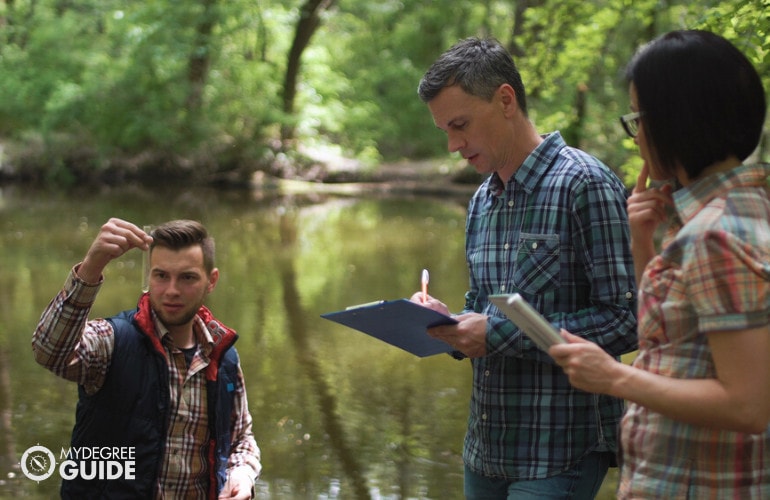
A doctorate can also help you qualify for a job at the EPA, National Park Service, or US Geological Survey.
Editorial Listing ShortCode:
Many PhD graduates work in a lab or office, but some environmental scientists might also spend lots of time in nature. They can conduct fieldwork, take measurements or samples, or help with engineering planning and oversight.

Universities Offering Online PhD in Environmental Science Degree Programs
Methodology: The following school list is in alphabetical order. To be included, a college or university must be regionally accredited and offer degree programs online or in a hybrid format.
Antioch University
Antioch University offers an online PhD in Environmental Studies program. To apply, applicants must submit 3 letters of recommendation.
The program can typically be completed in 4 years and requires 69 credits to graduate. During the first two years of the program, students must attend an 8 day summer program. They must also attend in-person classes over 4 weekends during certain semesters.
Antioch University is accredited by the Higher Learning Commission.
Mississippi State University
Mississippi State University offers an online PhD in Civil and Environmental Engineering program. Applicants must have a GPA of 3.0 to be eligible.
Students may choose to specialize in one of seven different areas, including Environmental Engineering. The program requires students to complete 18 hours of coursework and 20 hours of research for a thesis. Mississippi State University is accredited by the Southern Association of Colleges and Schools Commission on Colleges.
University of Missouri
The University of Missouri offers an online program for a PhD in Human Environmental Science with an emphasis in Architectural Studies.
To graduate, students must complete 72 credits. The program usually takes 5 years to complete. To be eligible for the program, applicants are required to have a GPA of 3.0 or higher, official transcripts, and 3 letters of recommendation. The University of Missouri is accredited by the Higher Learning Commission.
University of North Dakota
The University of North Dakota offers a PhD in Environmental Engineering. The program requires 90 credit hours and usually takes 7 years to complete.
Students may choose between online or in-person learning. Applicants must have a minimum GPA of 3.0 and must submit an online application with all official transcripts and references. The University of North Dakota is accredited by the Higher Learning Commission of the North Central Association of Colleges and Schools.
Villanova University
Villanova University offers an online PhD in Civil and Environmental Engineering program. To graduate, students must reach the minimum credit requirements, pass a qualifying exam and a comprehensive exam, and defend a PhD dissertation.
Applicants must submit all transcripts, 2 applicant rating forms, a statement of purpose, a resume, and official GRE scores.
Villanova University is accredited by The Middle States Commission on Higher Education.
Online PhD in Environmental Science Programs
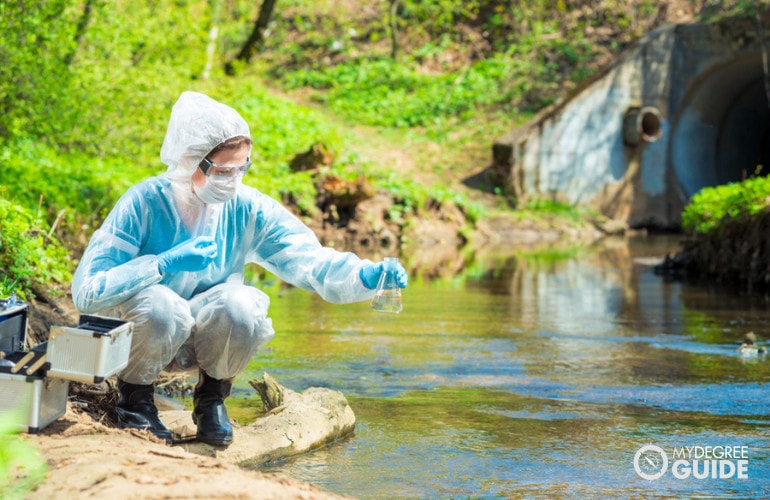
You may find that online PhD programs in environmental science continue where online masters in environmental science programs leave off in offering you advanced study in core topics as well as opportunities to pursue a concentration aligned with your graduate school interests and goals. The field can open doors to various roles, depending on your interests and aptitudes.
Quantitative data management and analysis, resource conservation, environmental engineering, public policy research, agricultural research, alternative energy research, teaching, and consulting are just some of the areas you can choose to do your dissertation research.
A doctoral program will typically include both technical learning and opportunities to conduct real-life fieldwork and complete authentic dissertation research projects and papers. Common careers in this field and related fields include environmental scientist, natural sciences manager, conservation scientist, and hydrologist.
Environmental Science Careers & Salaries
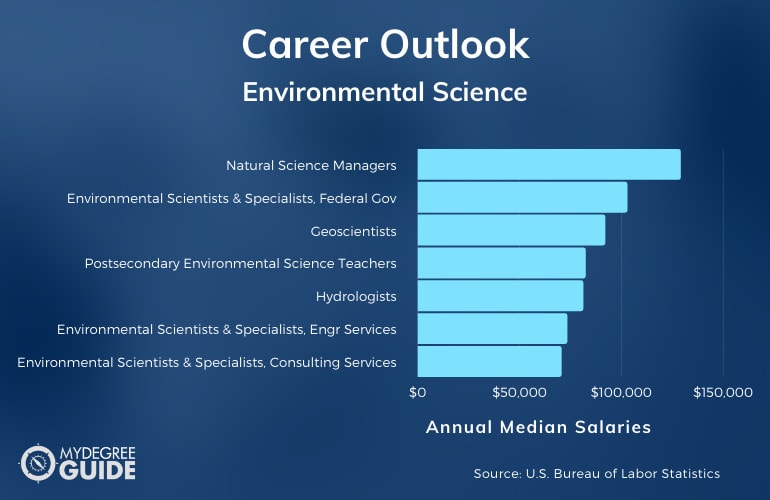
Not everyone who pursues a Ph.D. in Environmental Sciences will fit the same mold. Checking out different online environmental sciences and environmental studies graduate programs can help you see just how diverse the career paths can be.
Environmental scientists might work alongside civil engineers to provide geoscience or materials analysis expertise. They can also help develop and complete technical environmental impact reports.
According to the Bureau of Labor Statistics , a doctorate can help connect you to a range of well-paid and meaningful career paths.
Environmental scientists, researchers, and policy experts also have roles to play in resource management, conservation biology, and in climate science and climate monitoring. They can also work to protect and manage forests or other open spaces.
With a PhD you might want to pursue a university teaching position. You may also be interested in working with a professional consulting firm, consulting on engineering design challenges, or leading public interest advocacy initiatives.
Some professionals in the field work at federal agencies, such as the EPA, the US Geological Survey, the National Park Service, and the Department of Forestry.
Environmental Science Doctoral Curriculum
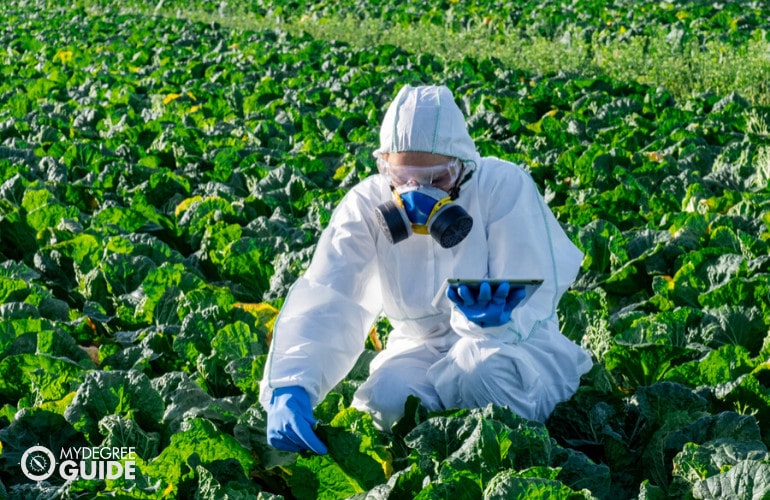
Many environmental science doctoral programs cover core topics—such as research methodology and design courses—and designate course clusters aligned to specific career-related graduate school concentrations.
- Environmental Science Management : You’ll learn about core methods and current perspectives in the field of applied environmental science, including land-use, resource protection, and resource management.
- Environmental Science Policy : This course is an overview of public policy development practices and challenges in areas such as ecology, climate change, pollution, soil conservation, and watershed protection.
- Environmental Engineering : This is a comprehensive course on different topics in environmental science, such as soil science and hydrology, as they relate to engineering planning, design, and regulatory compliance.
- Biosystems Modeling : You’ll learn about the methods and tools environmental scientists use to evaluate biosystems and model trends or impacts involving diverse and complex variables.
- Climate Modeling : This course looks at current climate trends, including risk forecasting and data systems, data interpretation methods, and methods for modeling a variety of climate variables and effects.
- Pollution Assessment : You’ll learn how to identify, measure, report, and track various forms of pollutants with diverse sources, and you’ll assess and model contaminants and their potential environmental impacts.
- Environmental Soil Chemistry : This course provides advanced understanding of soil conditions and dynamics with a focus on analyzing soil profiles and various research applications.
- Forest Hydrology : This course helps you understand water cycles and flood and drought dynamics, assess toxicity levels in water sources, and manage freshwater ecosystems.
- Data and Policy : This course is an in-depth study of environmental science data collection and data interpretation methods and controls in the context of policy formation and public policy reporting.
- Field Methods in Ecology : You’ll learn practical methods and participate in hands-on eco-system research, including the study of reliable methods for sampling, analysis, data collection, and data reporting.
Courses in an environmental sciences program will vary by school and program. Most doctoral programs in environmental science, though, require dissertation research or other substantive capstone components.
Admissions Requirements

Admissions requirements for an environmental science doctoral program vary by school and program. Some programs may accept students who have completed a bachelors degree while others will require you to have a masters. The following are common admissions criteria:
- Bachelors or masters in environmental science or related field
- Satisfactory GPA (usually 3.0 or 3.5)
- Letters of recommendation
- Relevant professional experience (if required)
- GRE or GMAT scores (if required)
When applying to an environmental science doctoral program, it can be helpful to provide evidence of the kind of future work or research you aspire to as well as how it relates to your doctoral studies and research interests.
Accreditation

When exploring environmental science PhD programs, it’s beneficial to make sure the school and program are fully accredited.
Regional accreditation testifies that a school meets acceptable standards for academic quality. The coursework in an accredited graduate school program teaches knowledge and skills that are on par with professional standards in your field.
Regional accreditation can also be a requirement for receiving some forms of financial aid. It can also help ensure that your degree will be honored by other schools and prospective employers. The Council for Higher Education Accreditation (CHEA) provides more information on accreditation.
Financial Aid and Scholarships

Getting a PhD in Environmental Sciences will typically require several semesters of advanced coursework, such as in basic and applied sciences. So, even if you work part-time as you learn, you may be one of many students who needs financial assistance in order to stay enrolled and stay focused on learning.
You might qualify for state or federal financial aid, need-based or merit-based scholarships, work study programs, or even employer-based tuition assistance. You can also apply for student loans to help you cover any financial gaps. Loan terms can vary, so it’s strategic to look over any student aid package or loan offering carefully.
If you’re anticipating applying for need-based assistance, you can start by filling out the Free Application for Federal Student Aid (FAFSA) .
What Are the 5 Major Fields of Environmental Science?

Environmental scientists work in a variety of fields and roles. Simply checking out the different course concentrations offered by online environmental science degree programs can help you identify the most popular fields today.
The 5 major fields of environmental science are:
- Social sciences
- Geosciences
- Environmental chemistry
- Atmospheric sciences
Your past work experiences and your future goals and aspirations can help you pick the best PhD program option with the right course concentrations.
Is Environmental Science a Useless Degree?

A doctoral degree in environmental science can help you develop your expertise in this interesting field. Environmental scientists can help private firms or government agencies with environmental impact studies or with civil engineering or conservation projects.
Professionals in the field can also use their expertise to work for federal agencies, such as the EPA, the US Geological Survey, or the US Forest Service. The need to respond to threats such as pollution, dwindling natural resources, or global warming could also drive new job growth in this field.
The Bureau of Labor Statistics forecasts that jobs for both natural sciences managers and geoscientists will have 5% growth. Environmental scientists are projected to have 8% job growth.
What Can You Do with a PhD in Environmental Science?
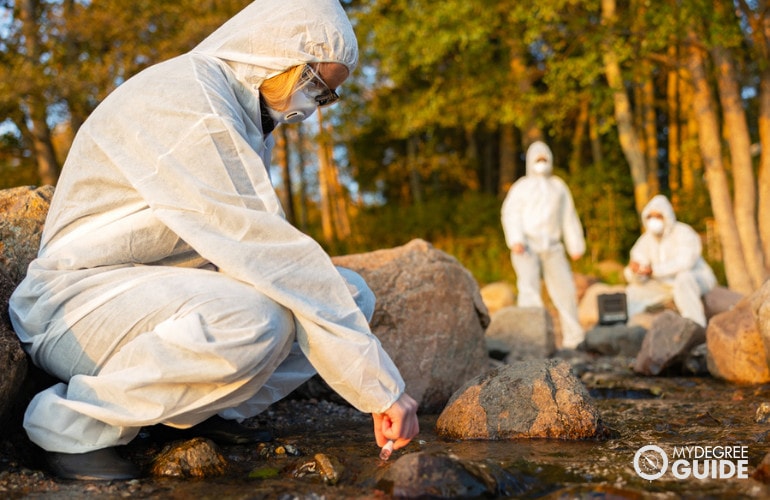
There are many options you can pursue with a doctorate in environmental science, depending on your goals and individual interests.
Some graduates are interested in doing lots of outdoor fieldwork related to ecology, climate, or agriculture. This could also include laboratory science, with data-crunching, data analysis, and data modeling in the basic and applied sciences.
Some environmental scientists devote themselves to initiatives focused on environmental sustainability. This can include protecting natural resources, improving open spaces, or combatting pollution or climate change.
If you’re interested in leadership or advocacy work, you might be interested in working as a researcher or public policy expert. A PhD can also help qualify you to teach university courses on environmental studies, environmental science, and environmental policy.
In private industry or private consulting roles, environmental scientists may work alongside civil engineers and civil engineering architects. They may also work on developing environmental impact statements.
Is a PhD in Environmental Science Worth It?

Yes, a PhD in Environmental Science is worth it for many students. Some graduates go on to work for a cause they’re passionate about. This can include protecting open spaces or ecosystems, leading public interest research, or using science to combat pollution or climate change.
In fact, jobs for geoscientists and conservation scientists are anticipated to grow 5% over the next ten years (Bureau of Labor Scientists). Meanwhile, environmental scientists and specialists are expected to experience 8% job growth, faster than the average for all occupations.
Getting a doctoral degree in environmental science can also be worthwhile if you’re interested in doing original research or field work. For example, there are doctoral programs that emphasize fieldwork, research design and methodology, quantitative analysis, and database management .
Earning a terminal degree like a PhD can also open up opportunities for well-paying consulting jobs, roles with the federal government, or teaching positions at a college or university.
Getting Your PhD in Environmental Science Online

If you have a passion for environmental science, then you may be interested in further developing your expertise through an online environmental sciences doctorate program. Regardless of the level, though, whether it’s an associates degree in environmental science online or a PhD, you may also get to build strong professional networks along the way.
Online environmental science graduate school programs offer a variety of study options and course concentrations, so you can find the right match for your preferred experiences and career pathways.
You can start this next step in your educational journey today by exploring online PhD environmental sciences program offerings from accredited universities.

Hand-Picked Top-Read Stories
Why you should or shouldn’t get a phd, what is self-plagiarism and how can you avoid it, what’s the difference between a dissertation and a thesis, trending tags, best online phd in environmental science programs, table of contents hide, a flexible approach to learning, environmental scientist, environmental consultant, sustainability manager, environmental policy analyst, conservation scientist, environmental educator, environmental data analyst, academic background, transcripts, letters of recommendation, statement of purpose, research proposal, cv or resume, standardized test scores, 1. antioch university, 2. california institute of integral studies, 3. university of north dakota, 4. viridis graduate institute, 5. mississippi state university, getting a ph.d. in environmental science online.
If you want to protect the environment while contributing to the economy, you may consider getting a PhD in environmental science. While a highly useful degree for professional advancements and personal goals, getting a PhD can be highly time-consuming. Many people choose to postpone their studies because they have to deal with multiple work and family commitments.
Getting an online PhD in environmental science could be an effective alternative. While you still get all the benefits of studying at the university of your choice, you can enjoy the flexibility of remote education.
Let’s take a closer look at getting a doctor of philosophy in environmental science online.
What It Means to Get a PhD in Environmental Science Online
A PhD in environmental science focuses on the study of the environment and its various components, including the interactions between living organisms and their surroundings. This rigorous program equips students with the necessary skills to:
- Conduct in-depth research
- Contribute to the field’s body of knowledge
- Address complex environmental challenges.
When considering the option of pursuing a PhD in environmental science online, you need to consider several pros and cons.
The best online programs provide flexibility and convenience, enabling students to balance their studies with other commitments. This flexibility is particularly beneficial for people who may already be working in the field or have other responsibilities that make attending traditional on-campus classes challenging.
Diverse and Inclusive Environment Online doctoral programs in environmental science often provide a diverse and inclusive learning environment. Students have the opportunity to interact with peers and faculty members from around the world. This brings together various perspectives and experiences and creates a wonderful networking opportunity.
Such a worldwide system can foster collaboration and the exchange of ideas. This learning experience can broaden students’ understanding of environmental issues on a global scale.
Innovative Technologies and Teaching Methods
Universities that offer remote PhD programs often leverage innovative technologies and teaching methods to deliver course materials. Through virtual classrooms, discussion forums, and multimedia resources, students can access a wealth of information. They can also benefit from interactive learning experiences.
These online platforms also help students develop strong digital literacy skills, which are increasingly valuable in today’s technology-driven world.
It is worth noting that online doctorate programs in environmental science still maintain the same rigorous standards as their offline counterparts. Students are expected to demonstrate a high level of self-discipline, motivation, and time management skills to succeed.
While the online format offers flexibility, it also requires you to be proactive in your learning and take responsibility for your progress.
Overall, the main advantage of getting a PhD in environmental studies online is the flexibility such studies offer. The disadvantage lies in the high self-discipline requirements for such a format of study.
Many students who haven’t tried at-home learning before could find it difficult to adjust. If you believe that studying on your own can be challenging, you may need to consider other options.
Career Opportunities After Completing Best Online PhD in Environmental Science
After completing an online doctor of philosophy in environmental science, graduates can explore an impressive range of rewarding career opportunities. Since the worldwide concern for the environment and sustainability is growing rapidly, professionals with expertise in this field are in high demand.
As an environmental scientist with a doctorate degree, you can work in research institutions, government agencies, or private consulting firms. They conduct studies, collect and analyze data, and provide insights into environmental issues such as:
- Climate change
- Conservation
Environmental scientists play a big role in developing and implementing strategies for sustainable resource management.
Environmental consultants work with organizations to ensure compliance with environmental regulations. They also develop sustainable practices. These professionals evaluate potential environmental risks, conduct environmental impact assessments, and provide recommendations for mitigating negative impacts.
As a consultant, you may also assist in developing environmental policies for businesses and government entities.
With a Ph.D. in environmental science, you can lead sustainability initiatives in various industries. Sustainability managers:
- Implement strategies to reduce environmental impact
- Enhance resource efficiency
- Promote sustainable practices within organizations.
You could get a job in sectors such as manufacturing, energy, transportation, or hospitality.
Environmental policy analysts help shape environmental regulations. They evaluate the effectiveness of existing policies, conduct research to identify emerging environmental issues, and provide recommendations for improvements.
As a policy analyst, you could get an opportunity to work with government agencies, non-profit organizations, or research institutions.
Conservation scientists focus on protecting and managing natural resources and ecosystems. They may work in wildlife preserves, national parks, or conservation organizations.
As a conservation scientist, you could conduct research, monitor biodiversity, and develop strategies for habitat restoration and species protection. Your work could become essential for preserving biodiversity and ensuring long-term ecological sustainability.
With an online Ph.D. in environmental science, you can pursue careers in academia or environmental education.
You can become a professor or researcher in a university or college. Environmental educators also work in non-profit organizations, museums, and science centers. There, you could develop educational programs and materials to raise awareness about environmental issues.
In the era of big data, environmental data analysts are in high demand. These professionals collect, analyze, and interpret large datasets related to environmental parameters. They use statistical models and data visualization techniques to identify patterns, trends, and correlations.
As an environmental data analyst, you could work in research organizations, government agencies, or private companies involved in environmental assessment.
These are just a few examples of the diverse professional opportunities available to a person who pursues an online Ph.D. in environmental science. The field continues to expand, offering professionals the chance to make a significant impact on environmental sustainability.
Admissions Requirements for Best Online PhD in Environmental Studies
When applying for an online Ph.D. in environmental science program, prospective students should be aware of the general admissions requirements. While specific requirements may vary between institutions, there are several common criteria that you can expect. Here are just a few of them:
Most programs require applicants to hold a master’s degree in a related field, such as environmental science, ecology, biology, or a related discipline. Some schools may settle for an applicant with a bachelor’s degree who also has relevant experience in the field.
You would have to submit official transcripts from all previous institutions. These transcripts provide evidence of your educational performance. Some schools may require a certain GPA range. In most cases, they want to see a GPA over 3.0.
The admissions board often asks prospective students to submit reference letters from academic or professional references. These letters describe your abilities, achievements, and potential for success in a Ph.D. program.
You can ask professors from your previous places of study or employers to write such letters. Usually, you need at least two of them. Some schools can ask for three.
A well-written statement of purpose allows you to highlight your research interests, professional goals, and motivations for pursuing a PhD in environmental science. It should demonstrate a clear understanding of the field and articulate how the program aligns with your educational and professional aspirations.
Some programs may require a research proposal outlining a potential research project. This proposal should highlight your research question, methodology, and potential contributions to the field of environmental science.
You usually have to include a detailed CV or biography that outlines your educational background, professional experiences, research projects, publications, and any relevant achievements.
While not always mandatory, some programs may require you to submit scores from standardized tests such as the GRE (Graduate Record Examination). If English isn’t your native language, you may need to share scores from English proficiency tests, such as TOEFL or IELTS.
Top Programs for Getting an Online PhD In Environmental Science
While you are browsing opportunities for getting an online doctor of philosophy in environmental science, you can consider these programs. All of these schools have excellent doctorate opportunities for people who want to advance their skills and knowledge in the subject.
Antioch University has several campuses in different states including California, New Hampshire, and Washington. They offer a strong online PhD in environmental science program that can be completed both online and offline. The hybrid nature of the program means that some class time would have to be done on campus.
Admissions requirements include:
- Master’s degree in environmental science or related fields
- Official transcripts from all previously attended schools
- Three letter of reference
- Curriculum vitae
- Personal statement
- Writing sample (professional or academic work)
The school is accredited by the Higher Learning Commission.
California Institute Of Integral Studies is located in San Francisco. It has a robust online PhD program in Ecology, Spirituality, and Religion . During your doctorate studies in this school, you will learn about traditional cultures and new worldviews while addressing ecological trauma. You will gain skills to help you with environmental exploration and knowledge to respond to existential threats.
- Bachelor’s and master’s degree in the relevant field
- A GPA of 3.0 or higher
- Official transcripts from all previously attended educational institutions
- Academic writing sample
- Resume or CV
- Research proposal
- Two letters of recommendation
The school is accredited by WASC Senior College and University Commission.
The University of North Dakota is located in Grand Forks, MD. It has a competitive online PhD program in environmental engineering . While the program is mostly taught online, you would have to visit the campus at least three times to make a presentation. You will get unlimited coaching, round-the-clock access to learning materials, and your own educational advisor.
- A GPA of 2.75 or higher
- English proficiency test results (if English isn’t your native language)
- Three letters or recommendation
Viridis Graduate Institute is a non-profit distance learning institution. It gives you an opportunity to become a Doctor of Arts in Ecological Psychology & Environmental Humanities . The program is specifically designed for online students and offers comprehensive support for distance learning. During your studies, you will develop ecological literacy and gain psychological capabilities that help you address current environmental problems.
- One letter of academic recommendation
- Zoom interview
The school is accredited by the Distance Education Accrediting Commission (DEAC).
Mississippi State University is located in Starkville, MS. It offers a robust online Ph.D. program in Environmental Engineering . You will gain new skills and knowledge in the field through interacting with several advisors, experienced faculty, and a network of professionals who have succeeded in environmental engineering across numerous industries.
Admissions requirements:
- GPA of 3.0 or higher
- TOEFL or IELTS test results if English isn’t your native language
- Statement of purpose
- Three letters of recommendation
The school is accredited by the Southern Association of Colleges and Schools Commission on Colleges (SACSCOC).
A Ph.D. in environmental science can open many doors for professionals who already work in the field as well as for those who want to change the direction of their careers.
Getting a Ph.D. in environmental science online is an excellent option for students who want to advance their careers without having to give up on their ongoing commitments. By browsing schools that offer doctorate studies remotely, you can get an idea of which option is the best for your current needs.

PHD in Economics, Associate Professor, Department of Business Process Management, Faculty of Market Technologies IOM
DISCOVER THE INNOVATIVE WORK WE ARE DOING ON:
- Air, Food & Water
- Art & Culture
- Cities & Towns
- Climate Change
- Energy & Technology
- Environmental Justice
- Law & Policy
- Nature & Conservation
- Sustainable Business

Ph.D. in Environment and Sustainability
Our Environment and Sustainability Ph.D. equips students with diverse perspectives to develop profound new ideas, knowledge and approaches to the most important concerns facing people and the planet. The program provides training to develop deep understandings of the structures of current environment and sustainability issues today and to develop analytical research to address them. This requires learning in multiple disciplines and how they, together, can better provide greater knowledge to bear to the social, environmental, political, scientific and economic factors creating the situation we face today. Our goal is to prepare students for a range of careers in academia, as well as public and private sectors.
Climate Strategies
Talking solutions with Marilyn Raphael, director of UCLA’s Institute of the Environment and Sustainability

Dangerous combination of extreme heat and smoke affected 16.5 million Californians
“as a passionate environmentalist and social justice organizer, students with diverse views helped me value mainstream and economically-framed solutions”.
Cassie Gardener-Manjikian
Take the next step
How to Apply Learn more
Graduate School
- Resources to Prepare for Graduate School
- Adonara Mucek, Ph.D. Geology '17
- Adriana Mendoza, Ph.D. Mathematics '14
- Andrew Olsen
- Becca Maher ('21, Ph.D.)
- Bryan Lynn, Ph.D. Integrative Biology
- Celeste Frazier Barthel, Ph.D. Education '21
- Diane Brandt
- Francesca Germano, Toxicology, M.S.
- Garrett Rogers
- Jafra Thomas
- Jen Hayes, Horticulture, PhD
- Jordan Jimmie
- Jordan Spradlin, Public Health, MPH
- Kalina Fahey, Psychology, Ph.D.
- Katie Stelling, Earth, Ocean and Atmospheric Sciences, Ph.D.
- Kelsey Contreras
- Layla Ghazi
- Marie Tosa, Ph.D. Wildlife Sciences
- Sara Letton
- Tiara Walz, Ph.D. Public Health
- Glossary of Terms
- Master's Students
- Doctoral Students
- Certificate Students
- Graduate School Orientation 2024
- Graduate Teaching Orientation 2024
- Do I Qualify to Attend Graduate Summer Step?
- Orientation for Winter, Spring and Summer Terms
- Co-sponsorships
- Your Graduate Committee
- Student Resources
- Grad Research Photo Competition
- Tips for Scheduling Committee Meetings
- Program of Study
- Formatting a Thesis or Dissertation
- Pretext Pages Templates
- Commencement
- Grad Inspire
- Grievance Procedures
- Request a Workshop
- Earning Concurrent Degrees or Pursuing a Dual Major
- Career Preparation
- Grad Writing Group Challenge
- Graduate Writing Center Online
- Changing or Adding a Degree, Major or Certificate
- GRAD 420 - Graduate School Preparation
- GRAD 512 - Current Issues in Higher Education
- GRAD 513 - Professional Development in College and University Teaching
- GRAD 516 - Graduate Teaching Seminar
- GRAD 520 - Responsible Conduct of Research
- GRAD 521 - Research Data Management
- GRAD 542 - The Inclusive College Classroom
- GRAD 543 - Dialogue Facilitation in Professional Contexts: Skills and Practice for Graduate Students
- GRAD 550 - Introduction to Online Course Development and Facilitation
- GRAD 560 - Theories of Teaching and Learning
- GRAD 561 - Course Design and Methods
- GRAD 599 - Creating Happiness
- GRAD 599 - Cultivating Productive and Positive Academic Relationships for Graduate Success
- WR 599 - Graduate Writing for English Language Learners
- WR 599 - Scientific and Technical Research Writing
- WR 599 - Writing Workshop for Thesis and Dissertation Writers
- OSU Grad Advantage
- Graduate Faculty Membership
- Graduate Council Representatives
- Policy updates
- Holistic Admissions
- Defining the Graduate Mentor
- The Importance of Mentors
- Apprenticeship and Mentoring
- Mentor and Mentee Pairing
- Maintaining and Evaluating Mentoring
- Suggestions for Mentoring Programs
- Handbooks, Manuals, and Guides
- Mentoring Bibliography
- Communication Items
- Detailed Considerations for a Joint Degree Program
- MOU Outline for Creating a Joint Program
- College and Program Recruitment Representatives
- Graduate Recruitment Tips
- Helpful Recruitment Links
- Shared Graduate Recruitment Schedule
- Leave of Absence and Family Medical Leave Eligibility
- Mentor Training for Faculty
- Student Funding
- Student Progress
- Student Progress Information for Programs
- Student Registration Information
- August 2023 Newsletter
- Sept 2023 Newsletter
- October 2023 Newsletter
- November 2023 Newsletter
- April 2024 Newsletter
- Dec 2023 Newsletter
- Feb 2024 Newsletter
- Jan 2024 Newsletter
- June 2024 Newsletter
- March 2024 Newsletter
- May 2024 Newsletter
- Strategic Plan
- Request Info
- Current Students
- Faculty Resources
You are here
Phd in environmental sciences, ormanmorton081.jpg.

Students must complete at least 108 graduate credits from the following areas:
- Environmental Sciences Core Courses, 6 Credits
- Methods and Numerical Skills, 9 Credits Minimum
- Area of Concentration, 30 Credits Minimum
- Elective Courses, 26 Credits Maximum
- Thesis, 36 Credits
To encourage the development of interdisciplinary graduate study programs, guidelines for course selection are flexible. In addition to the ES Graduate core courses, students must complete courses that constitute an area of concentration (or track).
Download a program of study template (.docx)
Learn about the program requirements and how to apply
Environmental Sciences Core Courses
The graduate core consists of three courses, totaling 6 credits. The purpose of the core is to introduce new students to faculty, to give students a sense of programmatic identity, to foster interdisciplinary thinking among students and faculty, to expose students to the breadth of existing environmental science courses, to expose students to a specific area in environmental science, to give students the opportunity for academic exploration, and to teach research skills.
The two courses are:
- Environmental Perspectives and Methods ENSC 515 (3 credits, Fall term)
- Environmental Analysis ENSC 520 (3 credits, Winter term)
Methods and Numerical Skills Courses
Courses in research methods, experimental design, statistical analysis, and modeling ensure students have sufficient skills for environmental research. Nine credits minimum of course work are required for the Ph.D. degree.
- Areas of Concentration (Tracks)
Sets of courses that constitute an area of concentration have been established to give focus to study and research. Eight areas of concentration have been defined. New areas of concentration can be developed by groups of faculty and students. Areas of concentration consist of at least 30 credits for Ph.D. students. See the list of concentrations.
Elective Courses
Elective courses are listed in the student's program of study, and agreed upon by the student and the advising committee. Courses may be selected to provide additional background, to explore new areas, and to add depth to a program.
Ph.D. Thesis or Manuscript Model
A central purpose of the Ph.D. degree is to teach students the process of environmental research. A minimum of 36 credits are required for original research leading to a Ph.D. thesis, or manuscript model, that complies with standards established by the Graduate School and the Environmental Sciences Graduate Program. Consult the ESGP handbook, the Graduate School website, and your committee for Ph.D. thesis guidelines.
Example guidelines for the manuscript model are found here and may be modified by your committee (2 or 3 papers) as relevant.
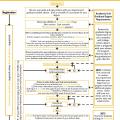
Preliminary Exam
Students are required to take a preliminary exam when working towards a doctor degree. Please review the preliminary exam guidelines.
Environmental Sciences Graduate Program
- Master of Science Degree
- Professional Science Master's Degree
- Environmental Management Graduate Certificate
- Minor in Environmental Sciences
- Accelerated Masters
- Application Process
- Funding Options
- Handbook, Learning Outcomes and Research Ethics
- Duties of your Major Professor and Committee
- Student List
- Alumni Stories
- FAQs for ESGP
- Professional Meetings
Contact Info
Graduate School Heckart Lodge 2900 SW Jefferson Way Oregon State University Corvallis, OR 97331-1102
Phone: 541-737-4881 Fax: 541-737-3313
- Programs - Majors, minors and certificates
- Academic Progress
- Student Success
- Faculty Support
- Staff Directory
- Graduate Catalog
Environmental Science & Engineering
Share this page.
Environmental science and engineering is a field within the Engineering Sciences area of study at the Harvard John A. Paulson School of Engineering and Applied Sciences. Prospective students apply through the Harvard Kenneth C. Griffin Graduate School of Arts and Sciences (Harvard Griffin GSAS). In the online application, select “Engineering and Applied Sciences” as your program choice and select "PhD Engineering Sciences: Environmental Science and Engineering" in the area of study menu.
Environmental science and engineering is an interdisciplinary program with the common goal of understanding, predicting, and responding to human-induced environmental change. You will learn that addressing environmental issues requires perspectives from a diverse set of scientific disciplines, including atmospheric physics and chemistry, oceanography, glaciology, hydrology, geophysics, ecology, and biogeochemistry.
Your research will be strongly interdisciplinary, with many connections to Earth and Planetary Sciences and other science and policy programs at Harvard. You will learn to think about environmental processes in an integrated fashion, preparing you to manage the environmental challenges we face.
Examples of projects current and past students have worked on include building bio-inspired robotics and developing personalized exosuits to assist in real-world walking.
Graduates of the program have gone on to a range of careers in organizations like the World Bank, the Earth System Research Laboratory at the National Oceanic and Atmospheric Administration (NOAA), and Tesla. Others have positions in academia at Georgia Tech, Oregon State University, and University of Rochester.
Standardized Tests
GRE General: Not Accepted
APPLICATION DEADLINE
Questions about the program.

Environmental Science

- Graduate Program
Ph.D. in Environmental Science
Doctoral program.
The Doctoral degree in Environmental Science is a research degree that requires successful completion of an innovative dissertation project. A five- to six-faculty member Doctoral Committee will help the student select courses for a degree plan. Students entering the Ph.D. program without a MS degree are required to take a minimum of 72 hours of graduate-level course work, while students entering the Ph.D. program with an MS degree are required to take a minimum of 42 additional hours. The Ph.D. degree requires the entire Foundation Core (4 hours), 12 credit hours from at least 3 of the distribution groups, 7 organized elective courses (incoming w/o Master's) or 4 organized elective courses (students w/ previous Master's in related field, such as biology, chemistry, or environmental science), as well as 12 hours of dissertation research. Organized electives do not include special problems credit hours or research credit hours, and may be selected from the core groups as electives or from non-core options as agreed upon by the student's advising committee. Here is a flow chart/diagram that illustrates the requirements. See the Environmental Sciences Curriculum page for further information.
For further information concerning the PhD application process, please visit here .
- Application Process
- Prerequisites
CORE & DISTRIBUTION REQUIREMENTS
The core and distribution requirements are describe under environmental science curriculum. The remaining hours in the curriculum can come from one of the cores or from diverse perspectives across non-core electives at the direction of the student's graduate advising committee in addition to thesis/dissertation research hours.
CONCENTRATIONS (PHD ONLY, OPTIONAL)
Students may elect to specialize in one of five areas of concentration , such that the identified concentration is listed on their transcript when she/he graduates. The five concentrations are Ecology and Conservation Biology, Geoscience, Human Ecology, Toxicology, and Science Education Research. Please select the hyperlink to find more information about the requirements of each concentration.
REQUIREMENTS OF THE PROGRAMS
These guidelines generally follow the requirements published in the Graduate Catalog for Biological Sciences ( http://www.unt.edu/catalog/grad/biol.htm ).
Doctoral Degree
The PhD degree is a research degree that includes the requirement of a scholarly dissertation based upon original research. Students entering the Ph.D. program immediately after a Bachelor's degree are required to take a minimum of 72 hours of graduate-level course work, while students entering the Ph.D. program after the Master's Degree are required to take a minimum of 42 additional hours of graduate-level course work.
The Ph.D. degree requires the entire Foundation Core coursework (4 hours), one to two classes from three of the four distribution groups (12 hours), elective courses as agreed upon by the student's advisory committee, as well as 12 hours of Dissertation (e.g., BIOL 6950).
- The degree plan should be completed by the end of the student's second semester.
- Core requirements should be completed by the end of the 2nd year (doesn't mean it can't extend beyond, but student's eligibility for TA etc., may become jeopardized).
- Comprehensive Exam and Proposal should be completed no later than 3.5 years upon entry (i.e., you have 18 mos. post completion of coursework to complete both qualifiers and proposal).
- In total, a student should complete all coursework, qualifiers and proposal within 3.5 years of entry into the program.
- The Comprehensive Exam and Proposal represent separate entities. The oral exam can include the student's proposed research but is not contingent on him/her having completed the proposal. In other words, the oral is open-ended - depending on performance of written exams, general questions or research-related questions.
- Comprehensive exams include both a written section and a separate oral component. Both should be completed within a defined ~2 week period, with the student deciding how he/she wishes to space the 2 exams out over the defined period.
- The proposal may be drafted any time but formal submission cannot be completed (i.e., signed off on by all committee members) until a student has completed the Comprehensive Exam. The proposal shall consist of a written document and whether it is to include a presentation by the student (for his/her committee or the academic public) shall be left to the discretion of the student's adviser and committee.
- Failure to meet these requirements may result in probation and/or expulsion from the ES program by the EC.
ANNUAL REVIEW
At the end of each Spring Semester the ES graduate review committee will meet with students to assess their progress through the program. Review information will be used to guide progress and to make recommendations regarding teaching assistant funding (which is ultimately determined through the Department of Biological Science).
- ENV SCI Curriculum

Thinking about UNT?
It's easy to apply online. Join us and discover why we're the choice of over 46,000 students.
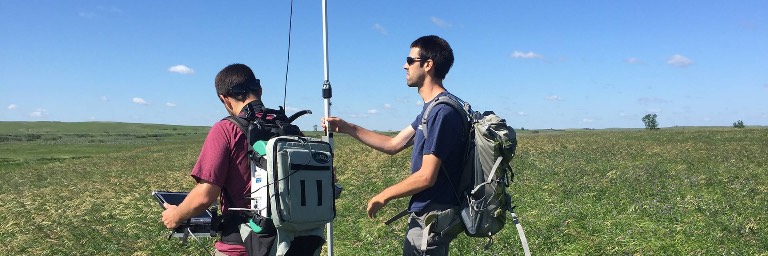
Earth System Science & Policy Ph.D.
Help drive new Earth system science and policy research to advance knowledge and develop original solutions to global sustainability challenges.
Learn to generate rigorous scientific inquiry that bridges the gaps identified in scientific knowledge. UND's Earth System Science & Policy Ph.D. combines theory with practice, global and local perspectives, and scientific and social disciplines.
Why earn an earth system science and policy Ph.D.?
If you're an international student, refer to the international application process for deadlines.
Sustainability science seeks to meet the needs of society while sustaining the life support systems of the planet. UND's Earth System Science & Policy Ph.D. program is practical in nature. The multidisciplinary nature of the curriculum ensures a comprehensive understanding of Earth systems and policies, enabling you to approach complex challenges with a holistic perspective.
You'll have opportunities to become a high-level researcher with the ability to generate new theories and knowledge. In addition, you will gain research expertise to be able to critically evaluate and identify gaps in existing knowledge.
The research, technical skills, and expertise you accumulate throughout the program are not just academic achievements; they directly translate into your capacity to influence environmental policies and regulations. As a graduate, you become a key player in the ongoing dialog surrounding sustainability. You’ll contribute to the development and implementation of policies that address pressing environmental issues. Your work can have a tangible impact on driving sustainability progress, fostering a harmonious balance between societal needs and the preservation of our planet's life support systems.
UND's Earth System Science & Policy Ph.D.
Gain the skills to generate creative new solutions to Earth system and sustainability problems, and to seize opportunities presented by a changing environment.
Prepare for a range of careers in industry, government agencies and higher education.
Generate rigorous and original scientific inquiry that bridges gaps in scientific knowledge.
Synthesize and communicate research results with a dissertation, peer reviewed publications and professional presentations.
Enhance your professional skills at 60+ free workshops offered through the UND School of Graduate Studies. Our goal is to provide you with the workforce skills and job search strategies to succeed.
Study at a Carnegie Doctoral Research Institution ranked #151 by the NSF. Students are an integral part of UND research.
What can I do with an earth system science Ph.D.?
Median salary range for a geoscientist
U.S. Bureau of Labor Statistics
Projected growth for the employment of earth scientists through 2031
Earth system science and policy research is a fast-growing field. It offers those with high-level graduate experience plenty of opportunity, especially considering today's environmental and sustainability issues, and evolving government regulations. This Ph.D. program offers the curriculum and research resources to prepare you for a successful career in:
- Private industry
- Government agencies
- Non-governmental organizations
- Academic professions
UND graduates can expect exciting opportunities to a wide range of professions, including:
- Earth system scientists
- Environmental and geospatial consultant
- Environmental project manager
- Governmental agency careers
- Non-governmental Organizations
- Chief environmental scientist
- Academic career
Earth System Science & Policy alumni have gone on to a variety of successful careers with:
- Advanced Engineering & Environmental Services, Inc.
- EMU Office of Research Development
- International Water Institute
- Dewberry Consultants, Inc.
- Environmental Communication Options
Earth System Science & Policy Ph.D. Courses
ESSP 503. Environmental Policy & Science. 3 Credits.
Human interactions with the Earth system are often managed through policy and science. This course will introduce students to concepts, ideas, practices, and challenges at the nexus of policy, science, and the environment. Students will examine the human dimensions of environmental problems and the different roles of policy and science in helping us address them. F.
ESSP 504. The Biosphere. 3 Credits.
The Biosphere ( ESSP 504 ) introduces students to the concept of the biosphere as articulated by Vladimir Vernadsky in the 1920s and 1930s, and examines the concepts and roles of nutrient cycling, biodiversity, evolution, ecology, and ecosystem productivity on Earth. The overall course is framed around the Drake equation and walks students through critical steps in the formation of the solar system, habitable zones around stars, evolution and proliferation of life on Earth, the interconnected nature of inorganic nutrient cycling and ecosystem function, and human's impact on all these systems, culminating with the final variable of the Drake equation--the longevity of civilizations--and humanity's active role in the Anthropocene. F.
ESSP 505. Energy Issues and Earth Systems. 3 Credits.
This course is about contemporary complex energy issues. It gives an overview of energy history, the last century trends and the achievement in energy production. It also discusses energy systems and energy "linkages" with society. It then examines the pros and the cons of both fossil fuels and alternative fuels. Finally it considers the future of energy in low-carbon energy systems. F.
ESSP 506. Ecosystem Services: Valuing Nature in a Market Society. 3 Credits.
Analyzes the services and goods provided by natural and human-made ecosystems with a primary focus on the agroecosystems and grasslands of the northern Great Plains. Explores the scientific framework of ecosystem services, their disruption or disturbance, economic and ecological values, methods of analyzing these values, and policy implications. S.
ESSP 507. Earth Systems Processes and Vulnerability Analysis. 3 Credits.
Earth Systems Processes and Vulnerability Analysis ( ESSP 507 ) will explore how humans exist on an active landscape. The course focuses on an understanding of the integration of the processes of physical Earth systems and the human vulnerability to hazards and Earth system syndromes related to these processes. The course also explores human vulnerability by analyzing spatial, numerical, and historical data, through spatial and statistical techniques. S.
Online Ph.D. in Earth System Science & Policy
best online graduate programs
best online college in North Dakota
Intelligent
UND's online Ph.D. in Earth System Science & Policy is fully online. You never have to come to campus.
UND is one of the most affordable online colleges in the region. For this program, we offer the same online tuition rates regardless of your legal residency. Compare and you’ll see UND is lower cost than similar four-year doctoral universities.
Flexible Online Ph.D. in Earth System Science & Policy Courses
With asynchronous classes, you do not attend class at a set time. If you need to balance work, family, and other commitments, this flexible format allows you to learn anywhere at any time.
Depending on your instructor, you’ll learn online through:
- Lesson modules
- Streaming video content
- Virtual libraries
- Posted lectures
- Online simulations
There will be times when you interact with your instructor and classmates through online discussion boards, polls, and chat rooms.
Your learning revolves around materials that can be accessed on your own time within a set time frame. However, this is not a self-paced course. You’ll have structure and deadlines.
Top-Tier Online Earth System Science Ph.D.
Over a third of UND's student population is exclusively online; plus, more take a combination of online and on campus classes. You can feel reassured knowing you won't be alone in your online learning journey and you'll have resources and services tailored to your needs. No matter how you customize your online experience, you’ll get the same top-quality education as any other on campus student.
- Same degree: All online programs are fully accredited by the Higher Learning Commission (HLC) . Your transcript and diploma are exactly the same as our on-campus students.
- Same classes: You’ll take courses from UND professors, start and end the semesters at the same time and take the same classes as a student on campus.
- Real interaction: You can ask questions, get feedback and regularly connect with your professors, peers and professionals in the field.
- Your own academic advisor: As an invaluable go-to, they’re focused on you, your personal success and your future career.
- Free online tutoring: We're here to help you one-on-one at no cost. Plus, get access to a variety of self-help online study resources.
- Unlimited academic coaching: Need support to achieve your academic goals or feeling stumped by a tough course? We'll help with everything from stress and time management to improving your memory to achieve higher test scores.
- Full online access: Dig into virtual research at UND's libraries. Improve your writing skills with online help from the UND Writing Center. Get online access to career services, veteran and military services, financial services and more.
- 24/7 technical support: UND provides free computer, email and other technical support for all online students.
- Networking opportunities: Our significant online student population means you’ll have a large pool of peers to connect with. UND has numerous online events and activities to keep you connected.
Best Online College
Our high alumni salaries and job placement rates, with affordable online tuition rates make UND a best-value university for online education. UND's breadth of online programs rivals all other nonprofit universities in the Upper Midwest making UND one of the best online schools in the region.
UND ranks among the best online colleges in the nation for:
- Affordability
- Student satisfaction (retention rate)
- Academic quality (4-year graduate rate)
- Student outcomes (20-year return on investment per Payscale.com)
Earth System Science & Policy
The earth is comprised of complex and interconnected systems. Learn about programs and research opportunities at UND.
Connect with the faculty you'll work with at UND or discover additional education opportunities.
- Department of Earth System Science & Policy
- Find Similar Programs
By clicking any link on this page you are giving your consent for us to set cookies, Privacy Information .
University of California, Santa Barbara

Become a leader in solving environmental problems through interdisciplinary research
Phd in environmental science and management.
Bren’s PhD in Environmental Science and Management is a doctoral program designed to develop the broad knowledge, analytical powers, technical skills, and innovative thinking required to be a leader in your field.
As a Bren doctoral student you have the opportunity to engage in research that crosses disciplines, and to take courses at the Bren School or in other renowned UCSB departments, such as geography, ecology, earth science, economics, political science, and marine biology. Choose from a research track in either Natural Sciences or Engineering, or in Social Sciences.
As a student in the Bren PhD program, you'll benefit from the school’s superb facilities, smaller size, close faculty mentorship, academic excellence, and opportunities to work across disciplines.
The Bren PhD program is mentorship-based; you will work closely with at least one Bren professor in their area of expertise. Your sponsor serves as your student advisor and the chair of your PhD committee. This faculty sponsor is also responsible for providing intellectual support and academic and career advice, as well as assisting you to obtain financial support from Graduate Student Researcher positions, Teaching Assistant positions, fellowships, and other areas of support.
The PhD program is intended to be full-time and courses are offered at the UC Santa Barbara campus. Currently, the Bren School does not offer any online degree options.
Your future as a leader in solving environmental problems begins with being prepared for admission to the PhD in Environmental Science and Management at the Bren School. The admissions team is here to answer your questions about eligibility, the application process, research, faculty sponsorship, and how to choose your path in a PhD program in environmental science and management.
The Bren PhD program academic requirements are highly individualized for your mentorship-based experience. The PhD in Environmental Science and Management is a research degree awarded upon demonstration of academic excellence and performance of original research. There is no specific unit requirement, though there are required interdisciplinary seminar courses that enrich your experience and help you complete research with integrity. For students also completing an optional PhD emphasis or certificate, additional requirements and coursework may apply.
PhD Emphases & Certificates
Enhance your PhD experience by adding an optional PhD emphasis and/or certificate. Students have several opportunities for:
Climate Science and Climate Change
Develop a broader understanding of the physical principles governing climate on Earth, climate changes associated with natural variability and anthropogenic forcings, and the impacts of climate change on the environment and society.
Economics and Environmental Science
Acquire a deep and expert knowledge of economics and the complex connections between the environment and economics.
Environment and Society
Receive additional training and mentorship in interdisciplinary studies such as global political economics, social justice, environmental politics, and population ecology.
Information Technology and Society
Explore further themes of the societal implications of information technology, including studies in media, science education and instruction, and data visualization.
Management Practice
Gain an in-depth understanding of entrepreneurial, business, and management practices in global technology-based companies.
PhD Research
The work of Bren PhD students is a balance of research and application to both understand and solve complex environmental problems. In pursuit of their passion in environmental science and management, Bren doctoral students are taking on environmental challenges in a range of topics, including climate change impacts, aquaculture and sustainable fisheries, wildlife conservation, coral reef resilience, fate and transport modeling, life cycle assessment, environmental politics, nanomaterials and micropollution, renewable energy resources, deforestation, and so much more.
Gain inspiration for your research topic from Bren's current PhD research projects and archive of dissertation titles.
Career Development
Whether you’re looking to apply your PhD to an academic or non-academic career path, we’re here to connect you to the advising, resources, and contacts you need to learn relevant job search skills and put your expertise to practice via real-world impacts. In addition to individualized, field-specific career guidance from your faculty advisor(s), as a Bren doctoral student, you’ll have access to supplemental career support from our highly celebrated Career Development team as well as the dedicated career and professional development staff at UCSB’s Graduate Student Resource Center .
Bren PhD alumni have gone on to successful positions as scientists, faculty members, researchers, managers, fellows, technical officers, and more within a variety of settings, including universities, corporations, think tanks, research institutes, consulting firms, and government agencies across the U.S. and globe.
Alumni Network Access and 24/7 Career Resources
From your first day at Bren, you’ll have access to BrenConnect, Bren’s unique career resources and alumni networking platform, where you can peruse fresh job listings, find and connect with Bren alumni, and access Bren-specific career guidance articles. Want to talk to a Bren grad who works at your dream organization? More than 75% of alumni are BrenConnect users.
Career Programming and 1-on-1 Guidance for Your Unique Career Journey
During your time at Bren, you’ll enjoy open access to the 40+ career workshops, speakers, and events hosted by the Career Development Team for Bren master’s students each year, allowing you to pick what and when to attend based on your needs and graduation timeline. To provide further guidance to doctoral students, the Career Development Team also hosts 1-2 PhD-specific workshops each year and partners with UCSB’s Graduate Student Resource Center (GSRC), which provides a full suite of additional workshops. These sessions cover academic and non-academic career topics, from how to write a teaching statement for faculty applications to how to leverage LinkedIn for a non-academic job search. In addition to individual guidance from your faculty advisor(s), both the Bren and GSRC career staff are available for one-on-one career advising on topics such as applying, interviewing, negotiating, and more.
This is a graduate school experience like no other where you'll have access to faculty mentors, potential employers, internship opportunities, and a professional network of alumni from day one. The Bren grad school experience has been designed to open doors for students to make a difference in the world. Our students often say they make friends and colleagues for life during their time at Bren.
PhD Symposium
PhD students at Bren organize and host an annual PhD Symposium in winter quarter, an event where PhD students give flash talks and present their research via a poster session to the campus community and general public. Students will also find opportunities to volunteer as part of the annual symposium committee.
PhD Retreat
Each year, Bren PhD students, faculty, and staff organize a retreat to welcome new students to the PhD program. The location of the retreat varies year to year and has been held in inspiring locations in nature, such as Yosemite and the California coast.
Are you ready to solve environmental problems?
Request more information, get to know the Bren School, and start planning your application today.

- Biochemistry and Molecular Biology
- Biostatistics
- Environmental Health and Engineering
- Epidemiology
- Health Policy and Management
- Health, Behavior and Society
- International Health
- Mental Health
- Molecular Microbiology and Immunology
- Population, Family and Reproductive Health
- Program Finder
- Admissions Services
- Course Directory
- Academic Calendar
- Hybrid Campus
- Lecture Series
- Convocation
- Strategy and Development
- Implementation and Impact
- Integrity and Oversight
- In the School
- In the Field
- In Baltimore
- Resources for Practitioners
- Articles & News Releases
- In The News
- Statements & Announcements
- At a Glance
- Student Life
- Strategic Priorities
- Inclusion, Diversity, Anti-Racism, and Equity (IDARE)
- What is Public Health?
Doctor of Philosophy (PhD) in Environmental Health
Offered by: Department of Environmental Health and Engineering
Onsite | Full-Time | 5 years
- MAS Application Fee Waiver Requirements
- Master of Arts (MA) in Geography and Environmental Engineering
- Master of Arts and Master of Science in Public Health (MA/MSPH)
- Master of Arts in Public Health Biology (MAPHB)
- Master of Bioethics (MBE)
- Mission, Vision, and Values
- Student Experience
- Program Outcomes
- For Hopkins Undergraduate Students
- Master of Health Science (MHS) - Department of Biochemistry and Molecular Biology
- Master of Health Science (MHS) - Department of Epidemiology
- Alumni Update
- MHS Combined with a Certificate Program
- Master of Health Science (MHS) - Department of Molecular Microbiology and Immunology
- Alumni Highlights
- Post-Baccalaureate Program in Environmental Health for Pre-Medicine Students
- Bachelor's/MHS in Health Economics and Outcomes Research
- MHS HEOR Careers
- Frequently Asked Questions
- Master of Health Science (MHS)
- Concurrent School-Wide Master of Health Science Program in Biostatistics
- Master of Health Science - Department of Population, Family and Reproductive Health
- Master of Health Science Online (MHS) - Department of Population, Family and Reproductive Health
- Careers in Health Economics
- Core Competencies
- Meet the Director
- What is Health Economics
- MPH Capstone Schedule
- Concentrations
- Online/Part-Time Format
- Requirements
Tuition and Funding
- Executive Board Faculty
- Master of Science (MS) in Geography and Environmental Engineering
- Independent Professional Project and Final Essay
- Program Objectives and Outcomes
- Internships
- Master of Science (ScM) - Department of Biochemistry and Molecular Biology
- Master of Science (ScM) - Department of Biostatistics
- Master of Science (ScM) - Department of Epidemiology
- Master of Science (ScM) - Department of Molecular Microbiology and Immunology
- ScM Faculty Advisers
- Master of Science in Engineering (MSE) in Geography and Environmental Engineering
- Bachelor's/MSPH in Health Policy
- FAQ for MSPH in Health Policy
- Field Placement Experience
- MSPH Capstone
- MSPH Practicum
- Required and Elective Courses
- Student Timeline
- Career Opportunities
- 38-Week Dietetics Practicum
- Completion Requirements
- MSPH/RD Program FAQ
- Program Goals
- Master's Essay Titles
- Application Fee Waiver Requirements
- Doctor of Philosophy (PhD) - Department of Biostatistics
- Doctor of Philosophy (PhD) - Department of Epidemiology
- Program Goals and Expectations
- Doctor of Philosophy (PhD) - Department of Molecular Microbiology and Immunology
- Doctor of Philosophy (PhD) - Department of Population, Family and Reproductive Health
- Doctor of Philosophy (PhD) in Clinical Investigation
- Track in Environmental Sustainability, Resilience, and Health
- Track in Exposure Sciences and Environmental Epidemiology
- Track in Health Security
- Track in Toxicology, Physiology and Molecular Mechanisms
- PhD in Geography and Environmental Engineering Faculty Advisers
- Recent Graduates and Dissertation Titles
- PhD Funding
- PhD TA Requirement
- Recent Dissertation Titles
- JHU-Tsinghua Doctor of Public Health
- Core Course Requirements
- Concentration in Women’s and Reproductive Health
- Custom Track
- Concentration in Environmental Health
- Concentration in Global Health: Policy and Evaluation
- Concentration in Health Equity and Social Justice
- Concentration in Health Policy and Management
- Concentration in Implementation Science
- Meet Current Students
- Combined Bachelor's / Master's Programs
- Concurrent MHS Option for BSPH Doctoral Students
- Concurrent MSPH Option for JHSPH Doctoral students
- Doctor of Medicine and Doctor of Philosophy (MD/PhD)
- Adolescent Health Certificate Program
- Bioethics Certificate Program
- Climate and Health Certificate Program
- Clinical Trials Certificate Program
- Community- Based Public Health Certificate Program
- Demographic Methods Certificate Program
- Environmental and Occupational Health Certificate Program
- Epidemiology for Public Health Professionals Certificate Program
- Evaluation: International Health Programs Certificate Program
- Food Systems, the Environment and Public Health Certificate Program
- Frequently Asked Questions for Certificate Programs
- Gender and Health Certificate Program
- Gerontology Certificate Program
- Global Digital Health Certificate Program
- Global Health Certificate Program
- Global Health Practice Certificate Program
- Health Communication Certificate Program
- Health Disparities and Health Inequality Certificate Program
- Health Education Certificate Program
- Health Finance and Management Certificate Program
- Health and Human Rights Certificate Program
- Healthcare Epidemiology and Infection Prevention and Control Certificate Program
- Humane Sciences and Toxicology Policy Certificate Program
- Humanitarian Health Certificate Program
- Implementation Science and Research Practice Certificate Program
- Injury and Violence Prevention Certificate Program
- International Healthcare Management and Leadership Certificate Program
- Leadership for Public Health and Healthcare Certificate Program
- Lesbian, Gay, Bisexual, Transgender, and Queer (LGBTQ) Public Health Certificate Program
- Maternal and Child Health Certificate Program
- Mental Health Policy, Economics and Services Certificate Program
- Non-Degree Students General Admissions Info
- Pharmacoepidemiology and Drug Safety Certificate Program
- Population Health Management Certificate Program
- Population and Health Certificate Program
- Product Stewardship for Sustainability Certificate Program
- Public Health Advocacy Certificate Program
- Public Health Economics Certificate Program
- Public Health Informatics Certificate Program
- Public Health Practice Certificate Program
- Declaration of Intent - Public Health Preparedness
- Public Health Training Certificate for American Indian Health Professionals
- Public Mental Health Research Certificate Program
- Quality, Patient Safety and Outcomes Research Certificate Program
- Quantitative Methods in Public Health Certificate Program
- Requirements for Successful Completion of a Certificate Program
- Rigor, Reproducibility, and Responsibility in Scientific Practice Certificate Program
- Risk Sciences and Public Policy Certificate Program
- Spatial Analysis for Public Health Certificate Program
- Training Certificate in Public Health
- Tropical Medicine Certificate Program
- Tuition for Certificate Programs
- Vaccine Science and Policy Certificate Program
- Online Student Experience
- Online Programs for Applied Learning
- Barcelona Information
- Registration, Tuition, and Fees
- Agency Scholarship Application
- General Scholarship Application
- UPF Scholarship Application
- Course Evaluations
- Online Courses
- Registration
- General Institute Tuition Information
- International Students
- Directions to the Bloomberg School
- All Courses
- Important Guidance for ONSITE Students
- D.C. Courses
- Registration and Fees
- Cancellation and Closure Policies
- Application Procedures
- Career Search
- Current Activities
- Current Trainees
- Related Links
- Process for Appointing Postdoctoral Fellows
- Message from the Director
- Program Details
- Admissions FAQ
- Current Residents
- Elective Opportunities for Visiting Trainees
- What is Occupational and Environmental Medicine?
- Admissions Info
- Graduates by Year
- Compensation and Benefits
- How to Apply
- Academic Committee
- Course Details and Registration
- Tuition and Fees
- ONLINE SOCI PROGRAM
- Principal Faculty
- Johns Hopkins RAPID Psychological First Aid
- General Application
- JHHS Application
- Areas of Study
- Important Dates
- Our Faculty
- Welcome Letter
- Descripción los Cursos
- Programa en Epidemiología para Gestores de Salud, Basado en Internet
- Consultants
- Britt Dahlberg, PhD
- Joke Bradt, PhD, MT-BC
- Mark R. Luborsky, PhD
- Marsha Wittink, PhD
- Rebekka Lee, ScD
- Su Yeon Lee-Tauler, PhD
- Theresa Hoeft, PhD
- Vicki L. Plano Clark, PhD
- Program Retreat
- Mixed Methods Applications: Illustrations
- Announcements
- 2023 Call for Applications
- Jennifer I Manuel, PhD, MSW
- Joke Bradt, PhD
- Josiemer Mattei, PhD, MPH
- Justin Sanders, MD, MSc
- Linda Charmaran, PhD
- Nao Hagiwara, PhD
- Nynikka R. A. Palmer, DrPH, MPH
- Olayinka O. Shiyanbola, BPharm, PhD
- Sarah Ronis, MD, MPH
- Susan D. Brown, PhD
- Tara Lagu, MD, MPH
- Theresa Hoft, PhD
- Wynne E. Norton, PhD
- Yvonne Mensa-Wilmot, PhD, MPH
- A. Susana Ramírez, PhD, MPH
- Animesh Sabnis, MD, MSHS
- Autumn Kieber-Emmons, MD, MPH
- Benjamin Han, MD, MPH
- Brooke A. Levandowski, PhD, MPA
- Camille R. Quinn, PhD, AM, LCSW
- Justine Wu, MD, MPH
- Kelly Aschbrenner, PhD
- Kim N. Danforth, ScD, MPH
- Loreto Leiva, PhD
- Marie Brault, PhD
- Mary E. Cooley, PhD, RN, FAAN
- Meganne K. Masko, PhD, MT-BC/L
- PhuongThao D. Le, PhD, MPH
- Rebecca Lobb, ScD, MPH
- Allegra R. Gordon, ScD MPH
- Anita Misra-Hebert, MD MPH FACP
- Arden M. Morris, MD, MPH
- Caroline Silva, PhD
- Danielle Davidov, PhD
- Hans Oh, PhD
- J. Nicholas Dionne-Odom, PhD RN ACHPN
- Jacqueline Mogle, PhD
- Jammie Hopkins, DrPH, MS
- Joe Glass, PhD MSW
- Karen Whiteman, PhD MSW
- Katie Schultz, PhD MSW
- Rose Molina, MD
- Uriyoán Colón-Ramos, ScD MPA
- Andrew Riley, PhD
- Byron J. Powell, PhD, LCSW
- Carrie Nieman MD, MPH
- Charles R. Rogers, PhD, MPH, MS, CHES®
- Emily E. Haroz, PhD
- Jennifer Tsui, Ph.D., M.P.H.
- Jessica Magidson, PhD
- Katherine Sanchez, PhD, LCSW
- Kelly Doran, MD, MHS
- Kiara Alvarez, PhD
- LaPrincess C. Brewer, MD, MPH
- Melissa Radey, PhD, MA, MSSW
- Sophia L. Johnson, PharmD, MPH, PhD
- Supriya Gupta Mohile, MD, MS
- Virginia McKay, PhD
- Andrew Cohen, MD, PhD
- Angela Chen, PhD, PMHNP-BC, RN
- Christopher Salas-Wright, PhD, MSW
- Eliza Park MD, MS
- Jaime M. Hughes, PhD, MPH, MSW
- Johanne Eliacin, PhD, HSPP
- Lingrui Liu ScD MS
- Meaghan Kennedy, MD
- Nicole Stadnick, PhD, MPH
- Paula Aristizabal, MD
- Radhika Sundararajan, MD
- Sara Mamo, AuD, PhD
- Tullika Garg, MD MPH FACS
- Allison Magnuson, DO
- Ariel Williamson PhD, DBSM
- Benita Bamgbade, PharmD, PhD
- Christopher Woodrell MD
- Hung-Jui (Ray) Tan, MD, MSHPM
- Jasmine Abrams, PhD
- Jose Alejandro Rauh-Hain, MD
- Karen Flórez, DrPH, MPH
- Lavanya Vasudevan, PhD, MPH, CPH
- Maria Garcia, MD, MPH
- Robert Brady, PhD
- Saria Hassan, MD
- Scherezade Mama, DrPH
- Yuan Lu, ScD
- 2021 Scholars
- Sign Up for Our Email List
- Workforce Training
- Cells-to-Society Courses
- Course/Section Numbers Explained
- Pathway Program with Goucher College
- The George G. Graham Lecture
About the PhD in Environmental Health Program
The Doctor of Philosophy (PhD) degree program is a full-time degree program that offers a unique interdisciplinary learning experience where the course of study is individually tailored based on the student’s interest in understanding and finding solutions to pressing problems in environmental health and engineering.
The goal of PhD training in EHE is to prepare graduates to engage in scholarship and professional practice that creates new knowledge, use research to transform practice and improve the health of the environment and the public, and effectively communicate research findings to the public. The program requires didactic coursework followed by an average of four to five years of research towards a doctoral dissertation (also referred to as a thesis on official forms and committees).
Training is offered through a core curriculum that is required of all PhD students in the Department with the addition of track/program-specific requirements and focused courses in specialized areas.
Students are expected to tailor their curricula, working with their advisers to create a comprehensive plan of study and research. PhD thesis must be based on original research, worthy of publication, and approved by the Department and a committee of thesis (dissertation) readers. PhD students must also be engaged in primary data collection as a component of their dissertation research or embedded in other research during their training here.
Our programs are offered in the Whiting School of Engineering , on the Homewood campus (WSE) and the Bloomberg School of Public Health (BSPH) East Baltimore campus. Students in all of our programs have the unique opportunity to take classes on both the Homewood and East Baltimore campuses in order to complete their degree requirements.
Students in the PhD in Environmental Health program select from one of four tracks:
Track in Exposure Sciences and Environmental Epidemiology (ESEE)
Track in Environmental Sustainability, Resilience, and Health (ESRH)
Track in Health Security (HS)
Track in Toxicology, Physiology, and Molecular Mechanisms (TPMM)
PhD in Environmental Health Program Highlights
Fully funded.
PhD students are guaranteed tuition, health insurance, and stipend coverage for 5 years. Health Security students receive four years of funding.
Multidisciplinary
Opportunities to work across departments in the Schools of Public Health, Engineering, and more
Write and Publish
Help with academic writing and grant proposals embedded into coursework, with opportunities to learn from published faculty and peers
Teaching Training
Teaching assistantships, training, and support for learning to teach, and opportunities for paid TA positions as well
What Can You Do With a Graduate Degree In Environmental Health?
Visit the Graduate Employment Outcomes Dashboard to learn about Bloomberg School graduates' employment status, sector, and salaries.
Sample Careers
- Assistant Professor
- Senior Consultant
- Data Scientist
- Environmental Toxicologist
- Epidemiologist
- Postdoctoral Fellow
Curriculum for the PhD in Environmental Health
Browse an overview of the requirements for this PhD program in the JHU Academic Catalogue .
Admissions Requirements
For the general admissions requirements see our How to Apply page.
Standardized Test Scores
Standardized test scores are not required and not reviewed for this program. If you have taken a standardized test such as the GRE, GMAT, or MCAT and want to submit your scores, please note that they will not be used as a metric during the application review. Applications will be reviewed holistically based on all required application components.
Vivien Thomas PhD Scholars
The Vivien Thomas Scholars Initiative (VTSI) is an endowed fellowship program at Johns Hopkins for PhD students in STEM fields. It provides full tuition, stipend, and benefits while also providing targeted mentoring, networking, community, and professional development opportunities. Students who have attended a historically Black college and university (HBCU) or other minority serving institution (MSI) for undergraduate study are eligible to apply. To be considered for the VTSI, you will need to submit a SOPHAS application, VTSI supplementary materials, and all supporting documents (letters, transcripts, and test scores) by December 1 , 202 3 . VTSI applicants are eligible for an application fee waiver , but the fee waiver must be requested by November 15, 202 3 and prior to submission of the SOPHAS application.

Faculty Advisers
The following faculty may be willing to advise PhD students. If you identify a faculty member that you want to work with who is not on this list, we encourage you to ask them about their availability.

Peter DeCarlo
Peter studies the chemical composition of gas particles in the air to improve our understanding of climate, air quality, and health impacts of pollutants.

Paul Ferraro
Paul is a Bloomberg Distinguished Professor with joint appointments in the Department of Environmental Health and Engineering and the Carey Business School. He is known for his research on behavioral economics and the design and estimation of impacts of environmental programs.
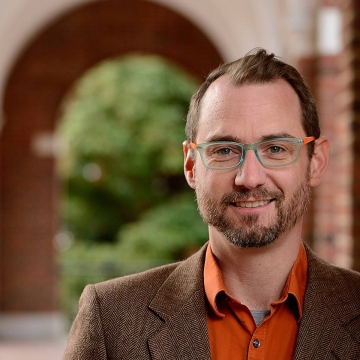
Ciaran Harman
Ciaran, an associate professor of landscape hydrology and Russell Croft Faculty Scholar, studies how the structure of landscapes controls the movement of water from rainfall to streams, and how that structure evolves over time.

Thomas Hartung
Thomas Hartung, MD, PhD, steers the revolution in toxicology to move away from 50+ year-old animal tests to organoid cultures and the use of artificial intelligence.
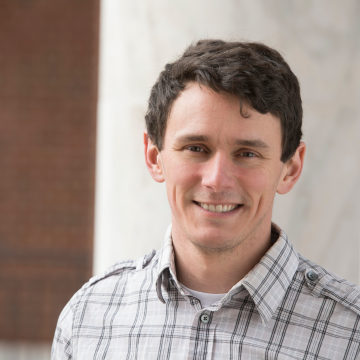
Scot Miller
Scot Miller combines satellite data and statistics to understand greenhouse gas emissions across the globe.

Roni A. Neff
Roni Neff, PhD '06, ScM, researches ways to cut food waste and address climate change through more resilient, equitable, and healthy food systems.
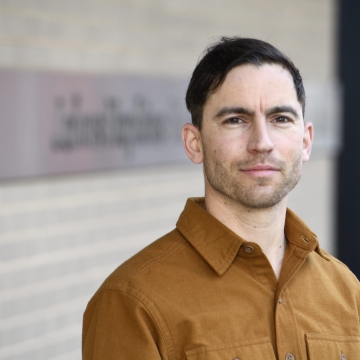
Carsten Prasse
Carsten's research focuses on the occurrence and fate of organic contaminants in the urban water cycle and their impact on environmental and human health.
Per the Collective Bargaining Agreement (CBA) with the JHU PhD Union, the minimum guaranteed 2025-2026 academic year stipend is $50,000 for all PhD students with a 4% increase the following year. Tuition, fees, and medical benefits are provided, including health insurance premiums for PhD student’s children and spouses of international students, depending on visa type. The minimum stipend and tuition coverage is guaranteed for at least the first four years of a BSPH PhD program; specific amounts and the number of years supported, as well as work expectations related to that stipend will vary across departments and funding source. Please refer to the CBA to review specific benefits, compensation, and other terms.
Need-Based Relocation Grants Students who are admitted to PhD programs at JHU starting in Fall 2023 or beyond can apply to receive a need-based grant to offset the costs of relocating to be able to attend JHU. These grants provide funding to a portion of incoming students who, without this money, may otherwise not be able to afford to relocate to JHU for their PhD program. This is not a merit-based grant. Applications will be evaluated solely based on financial need. View more information about the need-based relocation grants for PhD students .
Questions about the program? We're happy to help. [email protected]
Recommended pages
- Undergraduate open days
- Postgraduate open days
- Accommodation
- Information for teachers
- Maps and directions
- Sport and fitness
PhD by Distance Learning

The University of Birmingham's College of Life and Environmental Sciences now offers PhD by Distance Learning.
This means that wherever you are in the world, you may now be able register with the University of Birmingham for your Doctoral qualification but undertake the majority of your studies in your home location.
Why study by distance learning?
The main advantage of studying by distance learning is the flexibility. Financial and practical implications of moving closer to the campus make distance learning a more feasible option and could allow you to combine study with other commitments, including work and family. Similarly, your research could be related to your area of residence and therefore moving would be detrimental to your capacity to carry out the research.
Is the distance learning route for you?
The distance learning route to PhD study is not for everyone. You have to have a very clear idea of your project and be able to motivate yourself. Undertaking PhD study off campus can sometimes be quite isolating, so the ability to proactively seek out connections from within relevant research communities is important. This route is well-suited to those who have a research project associated with their work or particular interests and where resources are available locally, over via the internet, to support your research e.g. appropriate archives and data collections.
How will I be supported?
You will receive the same level of support and supervision as on-campus students. The only difference is that supervisory sessions will take place via audio and visual communication services such as Teams or Zoom, rather than in person.
What is the cost?
We charge an annual tuition fee which is the same as our standard on-campus PhD but includes:
- Economy class flights to and from Birmingham for the compulsory visit during the first year of your PhD
- Accommodation at the University for the compulsory one-week campus visit during the first year of your PhD
How often will I need to be on campus?
You will be required to make one compulsory visit to the University during the first year of your PhD. Reasonable travel and accommodation costs for this 1-week visit will be reimbursed. This visit will enable you to meet your supervisory team, undertake additional research skills training, and make a start to your doctoral studies. You will discuss the most appropriate time for this visit with your supervisory team.
Am I eligible?
Before we can offer you a place it is important that you have agreement from your potential supervisor and that they are satisfied that you will be able to undertake the PhD on an off campus basis. This may mean that slightly different entry requirements apply, such as English language and more extensive research skills training. Agreements will also need to be reached regarding some of the more practical aspects of undertaking the PhD in this way (for example attendance requirements, suitability of the chosen residency etc). It is important that arrangements are discussed early so that all parties involved know what to expect and to ensure you are able to successfully complete your studies.
Can I study by distance learning anywhere?
Distance Learning courses can be undertaken from anywhere in the world, including the UK.
However, it is worth noting that supervisory sessions for Distance Learning students will take place via audiovisual communications, such as Skype or Facetime, rather than in person.
While we have found that these 21st Century methods have proved popular, for those applicants who would prefer to visit the campus for face-to-face meetings with their supervisor, the traditional part-time study option may be more appropriate.
How to apply?
Find the programme that you wish to apply for in our course finder and click on the 'Apply' button.
As part of the application process, we will ask you to provide evidence to demonstrate that you have the time, commitment, facilities and experience to study for a PhD by Distance Learning. Please be prepared to provide evidence, and details, of the following:
- Examples of your postgraduate research experience and ability to work independently e.g. papers/presentations at professional and academic conferences or publications in professional journals or previous completion of an independent research project, etc.
- Full reasons (academic and personal) for registering for the distance learning mode of study rather than by standard full or part-time on-campus options. In particular, how you will be able to carry out your project in your chosen location.
- Access to local library facilities (where needed)
- Access to IT facilities
- Access to communications, including e-mail, and audiovisual communication media e.g. Skype and Facetime
- Access to facilities to support any study-related disability (where appropriate)
Please visit the course finder for a full list of subject areas available to study via distance mode.
- Request Info

- About Antioch University
- Core Attributes of an Antioch Education
- Equity, Diversity, Inclusion, and Belonging
- Why Antioch University?
- Common Thread
- Antioch Works for Democracy
- Executive Leadership
- Board of Governors
- Office of the Chancellor
Administrative Resources
- Accreditation
- University Policies
Discover Our Campuses
- Antioch Los Angeles
- Antioch New England
- Antioch Online
- Antioch Santa Barbara
- Antioch Seattle
- Graduate School of Leadership & Change
Academic Focus Areas
- Creative Writing & Communication
- Counseling & Therapy
- Environmental Studies & Sustainability
- Individualized Studies
- Leadership & Management
- Nursing & Health Professions
- Undergraduate Studies
Programs by Type
- Master’s
- Bachelor’s
- Certificates
- Credentials & Endorsements
- Continuing Education
Programs by Modality
- Low-Residency
Programs by Campus
- Los Angeles
- New England
- Santa Barbara
Academic Resources
- Academic Calendars
- Academic Catalog
- Disability Support Services
- Faculty Directory
- Writing Centers
- Admissions Overview
- Unofficial Transcript Evaluation
- Upcoming Admissions Events
- What to Expect
Information for
- International Students
- Transfer & Degree Completion Students
- Veterans & Military-Connected Students
Dates & Deadlines
Tuition & fees.
- GSLC Tuition & Fees
- AULA Tuition & Fees
- AUNE Tuition & Fees
- AUO Tuition & Fees
- AUSB Tuition & Fees
- AUS Tuition & Fees
Financial Aid
- Financial Aid Overview
- Financial Aid Forms
- Scholarships & Grants
- Types of Aid
- Work-Study Opportunities
- Discover GSLC
- Department & Office Directory
- The Antiochian Leader (Newsletter)
- Discover AULA
- Department & Office Directory
- Location & Contact Info
- Discover AUNE
- Location & Contact Info
- Discover AU Online
- Online Learning @AU
- Discover AUSB
- Location & Contact Information
- Discover AUS
- Department and Office Directory
- Advancement
- Grants and Foundation Relations
- Information Technology
- Institutional Effectiveness
- Strategic Partnerships
- Student Accounts
- Academic Assessment
- Consumer Information
- Licensure Information
- Resource List
- Student Policies
- Alumni Magazine
- Chancellor’s Communications
- Common Thread (University News)
- Event Calendar
Program Overview
Additional program details, tuition and financial aid, start your antioch journey, phd in environmental studies, find solutions to crucial environmental challenges.
Our doctoral program is founded on the conviction that theory and practice go hand-in-hand and that our most essential research questions arise from integrating professional experiences and scholarship. Approach your research with a multidisciplinary perspective, integrating science, policy, humanities, education, and service to pursue sustainable solutions to pressing local, national, and international environmental challenges. Our innovative low residency model allows you to pursue your PhD without putting your life on hold.
This degree is offered by AU New England in a low residency format.
The doctoral program in Environmental Studies is a 66-credit program that can be completed in 4-5 years. It utilizes a cohort-based low residency model to provide a rich learning experience accessible to working professionals.
In this program, you’ll engage in coursework and seminars with a diverse and supportive group of students and faculty whose experience and wide-ranging interests will augment your own. Specialize in the research area for which you have a passion and apply the theories and methods best suited to your research interests. Study with faculty who bridge disciplinary and methodological boundaries, who model the integration of scholarship and practice, who emphasize the role of service, and who are recognized locally, nationally, and internationally.
Environmental Studies integrates a wide range of concepts and ideas and embraces multiple methodological approaches to understanding and solving critical and emerging environmental challenges. The current areas of research interest and expertise among ES PhD students and faculty overlap significantly and intentionally and indicate the richness of content, dialog, scholarship, and practice in our program. The following illustrates the research areas of our students and faculty:
- Conservation Psychology
- Ecology and Conservation Biology
- Environmental Decision-Making, Policy, and Governance
- Environmental Humanities
- Environmental and Social Justice
- Environmental, Sustainability, and Science Education
- Food and the Environment
- Resilience, Climate and Environmental Change
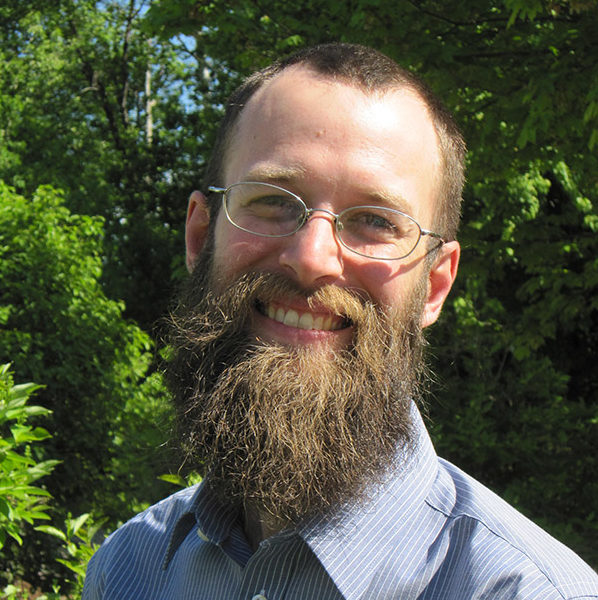
Jason Rhoades
Phd program director, core faculty.
Environmental Studies & Sustainability
Speak to the Program Director
Cohort-Based Learning Community
Our learning community encourages free and open inquiry, a sustained and challenging discourse, the consideration of diverse and multiple perspectives, issues of mutual interest, an awareness of the learning process, and room for self-reflection. Each entering class travels through the four phases of the program together as a cohort group, developing a deep interest in each others’ work, establishing lifelong bonds of friendship and collegiality, and developing measures of support and critique that are invaluable learning tools.
Hybrid Delivery Model
The program uses a hybrid delivery model. Students undertake their coursework through a combination of 1 on-campus residency per semester for the first three phases, along with synchronous and asynchronous online engagement. This hybrid approach allows students to participate in the program without having to uproot themselves and put their careers on hold.
Strong Faculty Mentorship and Advising
Mentoring and advising are crucial aspects of our learning community. The faculty cultivates strong mentoring relationships. During the first year of the program, students are encouraged to work closely with all of the faculty. Through coursework, they learn about each faculty member’s research interests and teaching approaches. Throughout all four phases of the program, students and faculty work very closely together in small classes, becoming intimately familiar with their common interests and ideas.
Upon entering the program, students are placed with an academic advisor who helps guide them through the initial phases of the program. During the second year, students typically chose a faculty member to serve as their dissertation chair. The chair is deeply interested in the student’s work, providing support and encouragement, helping the student develop substantive expertise, as well as exploring issues of voice and expression. Through various consultations, the student and chair become a learning team, thinking through scholarly choices and directions.

Take your next step – talk to our admissions team.
- Michael Akresh and Christian Carson Featured Guests on St. Vincent TV
- After 14 Years, Community Garden Connections Continues to Grow and Evolve
- In Bhutan, Collaborating to Ethically Preserve an Indigenous Bioculture
Student Backgrounds, Goals, and Outcomes
Students who pursue AUNE’s PhD in Environmental Studies are united by the desire to research and move forward crucial environmental issues. They have diverse academic, professional, and personal experiences that add value to the comprehensive curriculum. Our students’ and graduates’ backgrounds include:
- Academic and Research Positions. Field biologists and conservation biologists who enter this program typically have extensive practical experience and have worked for state, federal, nonprofit, and non-governmental organizations in the US and abroad. They frequently seek positions in academic settings or research institutions after earning their PhD.
- Advanced Environmental Scholarship and Research. Environmentalists with significant work experience pursue this program to grow both academically and professionally. They are reflective practitioners interested in furthering their scholarship and research.
- Career Advancement. Educators, college faculty without a doctorate, independent scholars, education and policy consultants, journalists, naturalists, conservation biologists, environmental educators, and recent graduates of master’s level ecology and environmental studies programs earn their PhD in Environmental Studies from AUNE to advance their chosen careers.
- New Approaches. Independent scholars, outdoor or adventure educators, therapists, social workers, writers, and artists interested in the psycho-spiritual aspects of environmental studies pursue this program to develop new approaches to learning, teaching, healing, and organizational change.
Current Students
Take a look at our current students and the work they are doing
ES PhD Student Dissertations
Explore examples of student dissertations
Upcoming Events
Environmental studies info session | aune, degree requirements.
Students have a maximum limit of ten years from the date of entry to complete all degree requirements, including the dissertation, and 66 semester-hour credits beyond a Master’s. The program is organized into four phases: Foundation Courses, Research Strategies and Learning Domains, Candidacy, and Dissertation. Each phase is described below. Students must complete the Qualifying Exam and successfully defend their Dissertation Proposal before admission to the Dissertation Phase. A listing of specific courses and course descriptions can be found in the Academic Catalogue .
Phase 1 – Foundation Courses (18 credits)
The initial phase of AUNE’s doctoral program in environmental studies instills the foundations of interdisciplinary environmental studies and scholarship through intensive, integrative, theoretically oriented courses. Topics include research design, ecological thought, applied ecological analysis, global environmental change, political economy and sustainability, and environmental history.
On Campus Residencies
- Summer Semester: 6-day intensive in June
- Fall Semester: 1 weekend in October
- Spring Semester: 1 weekend in March
Phase 2 – Research Strategies and Learning Domains (24 credits)
The program’s second phase includes a series of seminars about scientific research where students focus on methodologies, literature, and theoretical frameworks to guide their research interests. They discuss their work with leading scholars and writers and learn how others frame and execute their research. Students also design and complete four individual “learning domain” courses, each with an individual mentor, that allow them to focus and deepen their knowledge and research skills in their specific area of future dissertation research.
- Summer Semester: 6-day intensive
- Fall Semester: 1 weekend
- Spring Semester: 1 weekend
Phase 3 – Candidacy (9 credits)
During the candidacy phase (or the dissertation phase), students complete a service learning project related to their academic goals. In this phase, students also write and submit their qualifying exam in the form of an integrated essay about their area of research interests. Finally, students prepare and defend their dissertation proposals. The timing and sequence of the candidacy phase will vary for each student, depending on her or his own pace.
On Campus Residency
Phase 4 – Dissertation (12 credits)
During the fourth and final phase of the program, students participate in seminars designed to support all aspects of the dissertation process. They design and conduct original research and analyses that have direct social, environmental, political, and educational impacts. Finally, they write and defend their doctoral dissertation. This phase of the program can be completed entirely online with no required residencies on campus.
Residency Dates
Faculty spotlights.

Jason Rhoades, PhD

Elizabeth McCann, PhD
Core faculty.

Gopal Krishnamurthy, PhD
Interim chair.
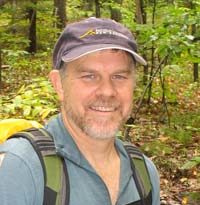
Peter Palmiotto, PhD
Core faculty, co-director, centers, & institutes, & student groups.
The Department’s many centers, institutes, and student groups offer students diverse and compelling opportunities to further their scholarship and practice while contributing to tangible positive change.
Antioch Spatial Analysis Lab (ASAL)
Center for climate preparedness & community resilience, institute for international conservation (iic), conservation psychology institute, the herbarium, keene community garden connections, monadnock ecological research & education project, wild treasures: sustainably, naturally, student alliance.
How to Apply
Antioch University New England processes applications for most programs on a rolling basis, so we encourage you to apply as early as possible. All application materials should be received in Admissions by the dates listed below. If you have any questions, please get in touch with the Admissions Department.
- Essay questions, admissions and program-specific
- Resume/curriculum vitae (CV)
- Non-refundable $50 application fee
- email transcripts to [email protected] , or
- mail to Office of Admissions Antioch University New England 40 Avon Street Keene NH 03431-3516
- Three letters of recommendation are required from people who are in a position to evaluate your professional or academic work. The person making the recommendation may not be related to you.
- There are additional requirements for International applicants
- Interview with a faculty member of the department to which you seek entry if selected. This can be in person, by phone, or via Skype.
- Master’s and Certificate Programs do not require the GRE or any other standardized test for admissions. We consider all of your application materials and evaluate your academic potential in a variety of ways.
Official transcripts should be emailed to [email protected] or mailed to the Office of Admissions Antioch University New England 40 Avon Street Keene, New Hampshire 03431-3516. All application materials submitted become part of an applicant’s file and cannot be returned.
As a graduate school providing doctoral-level education, Antioch University New England assesses each applicant’s academic experience and promise, personal and interpersonal competence, and professional experience and promise. Our aim is to attract a talented, committed student body marked by professional, ethnic, and cultural diversity. All doctoral students must maintain a full-time course load. Waiving required courses will be approved only in exceptional situations. Transfer coursework from another accredited doctoral program will be evaluated on a case-by-case basis.
Requirements
- A Master’s degree either in an environmentally-related field or in a field that has prepared the applicant to undertake the research required in the PhD program.
- In extraordinary circumstances, when the applicant can demonstrate significant life or professional experience, any of the aforementioned requirements may be waived by the Doctoral Admissions Committee.
- The Department of Environmental Studies does not require the GRE or any other standardized test for admissions. We consider all of your application materials and invite you to demonstrate your academic potential in a variety of ways.
The Doctoral Program in Environmental Studies requires an application portfolio, which must be received by the application deadline. The application portfolio includes seven documents:
- Application, which provides the most recent information about your education, professional experience, references, and other personal data.
- Transcripts from each college or university attended, indicating courses taken and degrees earned. Both undergraduate and graduate school transcripts must arrive at the Office of Admissions in a sealed envelope or sent via secure transcripts email service.
- Three letters of reference. These references should be from persons who are or have been in a position to evaluate your work. Your recommenders can submit their letter electronically using the online application or send a signed, sealed copy directly to Admissions.
- Personal statement
- Academic Plan. Prepare a narrative outline of your academic interests, including the principal areas of study, the seminal literature you may read, and some research ideas that flow from these interests. Briefly describe your initial ideas regarding the doctoral dissertation. We understand that these are initial ideas that will be revised throughout your program.
- Writing Sample. This should be one piece of professional or academic work that you think is representative of your finest efforts. It might be a published essay or a chapter of a book, a curriculum, a grant proposal, a business plan, a strategic plan, a newsletter, or other types of documents. The submitted document should not exceed fifteen pages in length. If your document is longer, please excerpt the most relevant section.
Doctoral education is an investment in your future. Let us help you understand the costs and explore the resources available to help make your college education even more affordable. The majority of AUNE students finance their education through some form of financial aid. You may not be sure which federal, state, public, and private aid packages – such as loans, scholarships, and grants – are right for you. Our staff is here to help you so you can focus on what’s most important: beginning your academic program at AUNE.
Tuition & Fees Financial Aid

Take your next step – talk to our admissions team to find the right program for you.
- Skip to Content
- Skip to Main Navigation
- Skip to Search

Indiana University Bloomington Indiana University Bloomington IU Bloomington

- High-impact Practices
- Bachelor of Science in Public Affairs (BSPA)
- Bachelor of Science in Environmental Science (BSES)
- Bachelor of Arts in Environmental and Sustainability Studies (BAESS)
- Bachelor of Science in Healthcare Management and Policy (BSHMP)
- Bachelor of Science in Arts Management (BSAM)
- Minors & Certificates
- Advising Staff
- General Ed and Intro
- Topics V450
- Topics V456
- O’Neill Launch
- Director’s Welcome
- Rising Leaders Program
- NextGeneration Leadership Program
- Indiana Leadership Program
- Courses & Faculty
- Estimated Costs
- Student Spotlights
- O'Neill Expo
- Required Internship
- Accelerated Master's Program
- O'Neill + Maurer JD
- Current IU Bloomington Students
- High School Students
- Transfer students
- For Current Students
- For Incoming Students
- Non-O’Neill Funding Opportunities
- Contact & Visit
- Academic & Leadership Programs
- Leadership Seminar Series
- Mission and Goals
- Core Curriculum
- Concentrations
- Washington, D.C. Accelerator Program
- Experiential Requirement
- Components & Concentrations
- Master of Environmental Sustainability (MES)
- Practicum Experience
- Executive Certification
- Master of International Affairs (MIA)
- MPA-MIA Dual Degree
- Experiential Requirements
- Faculty Profiles & Publications
- For Jacobs Students
- For Doctoral Students
- MAAA-MPA Dual Degree
- Additional Dual Degrees
- Certificates
How to Apply
- Fellowships & Financial Resources
- Prior Professional Experience Benefits
- Peace Corps
- Teach for America
- Military and Veteran Benefits
- Funding for Current Students
- Funding for International Students
- Federal Financial Aid
- Subscribe to our Newsletter
- Virtual Sessions & Webinars
- Experience Day
- Schedule a Visit
- Connect with a Current Student
- O'Neill Visits You
- Why O'Neill?
- Environmental Policy
- Public Finance
- Public Management
- Public Policy Analysis
Ph.D. in Environmental Science
- Environmental Science Fellowships
- On the Job Market
- Recent Placements
- Current Students
- Dissertations
- Why O’Neill ?
- Our Mission and Goals
- Degree Requirements and Curriculum
- O’Neill Online Week
- Nonprofit Management
- Public & Nonprofit Evaluation
- Tuition & Fees
- Financial Aid
- Meet Our Students
- Meet Our Alumni
- For Professionals
- For Military Students
- Helping You Succeed
- Information Sessions
- Executive Education
- Faculty Directory
- Environmental Research and Policy
- Racial Justice
- Research Areas
- Faculty Research Publications
- Laboratories
- Centers & Initiatives
- Working Research Groups
- Speaker Series
- Hites Prize
- Journals & Books
- Explore Careers & Outcomes
- Register Your Internships
- Internship Funds and Scholarships
- For Employers
- Careers Login
- Life at O’Neill
- Life in Bloomington
- Precollege Programs
- For International Students
- Resilience and Wellbeing Initiative
- O’Neill International
- Leadership Opportunities
- Student Organizations
- Virtual Tour
- Dean’s Welcome
- Strategic Goals and Progress
- About Paul H. O'Neill
- 50th Anniversary
- Environment, Climate, and Sustainability
- Mission, Vision, and Values
- School Profile
- Vietnam Young Leaders Award
- Activate O'Neill
- Support & Resources
- Bloomington & Indianapolis
- Careers at O'Neill
- Administration & Staff Directory
- Dean’s Council
- Get Involved
- Alumni Events
- Alumni Recognition
- Distinguished Alumni Council
- Alumni Board of Directors
- Areas to Support
- Ways to Give
- Our Supporters
- Alumni Communications
Paul H. O’Neill School of Public and Environmental Affairs
- Alumni & Giving
Program overview
O’Neill’s Ph.D. in Environmental Science Program provides skills and training in the basic and applied sciences to solve contemporary environmental problems. You’ll research and learn how to communicate solutions to policy makers, natural resource managers, and the general public. Through our interdisciplinary program, you’ll benefit from collaborative research among scientists from various natural and social science disciplines.
As a student in our Ph.D. in Environmental Science Program, you’ll:
- Acquire substantial knowledge in a primary environmental science concentration
- Develop breadth in related environmental science fields
- Become proficient in advanced research methods and develop expertise in a chosen dissertation topic
- Develop expertise in a chosen research topic, composing a dissertation of original research with careful and thoughtful analysis and interpretation of the findings
How to apply
Explore the Integrated Program in the Environment
Learn more about Water at IU
Description of the video:
Work with faculty with wide ranging expertise
Our environmental science faculty conduct research in a number of areas including applied ecology, atmospheric chemistry, biogeochemistry, bioremediation and environmental microbiology, conservation biology, contaminant fate and transport, forest ecology, environmental chemistry, GIS applications, global climate change, surface and groundwater hydrology, limnology, mathematical biology and statistics, meteorology and climatology, and toxicology and developmental neurobiology. Dissertation research may be interdisciplinary or may focus on a sub-discipline of environmental science. Specific research projects are highlighted in individual faculty profiles.
Featured faculty focused on environmental science
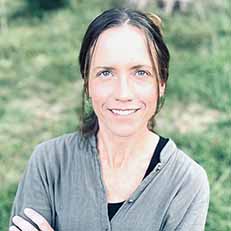
Kimberly Novick
Professor; Paul H. O'Neill Chair; Fischer Faculty Fellow; Director, Ph.D. Program in Environmental Sciences
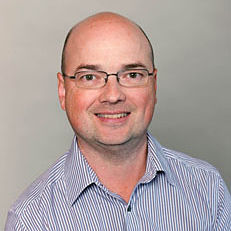
Philip S. Stevens
Associate Dean for Faculty Affairs, Rudy Professor
Admissions information
Applicants to this program should possess a baccalaureate degree in science, mathematics, engineering, or a closely related field. A statement of research interests is a key component of the admissions application and is used to match your research interests with those of one or more faculty members. Your statement should refer to a specific area (or areas) of research interest and identify potential research mentors by name.
Degree requirements
The Ph.D. in Environmental Science requires the completion of 90 credit hours in advanced study and research beyond the bachelor's degree. A student must complete 30 credit hours of advanced course work, 30 credit hours of research, taken as SPEA e625 or SPEA e890. The student, with approval of his/her advisory committee, should complete a combination of additional course work and research credit to meet the 90 credit hour requirement.
Course Requirements
The exact nature and amount of course work in each of three areas, principal field of study, breadth in environmental science, and research methods, will be determined by the Advisory Committee after review and approval of the student's plan of study.
- Selection of specific courses will focus on obtaining:
- Adequate knowledge for qualifying examinations
- International Relations
- Appropriate preparation for a research project
- A mixture of courses that meet the individual professional goals of the student
Fields of Study
Each student will define an interdisciplinary principal field of study and describe it in a narrative statement. Your narrative statement should discuss your previous educational experiences, outline a program of course work within the proposed field of study, and state your career goals and aspirations.
Each student is also required to prepare a program of course work that fulfills the requirement of breadth in environmental science. The breadth requirement may be fulfilled by using a wide spectrum of environmental science courses as well as areas such as economics, law, and management. You are also required to prepare a statement outlining research activities for the committee. Course work should include substantial training in mathematical, statistical and analytical research methods.
How to Apply
Featured environmental science alumni
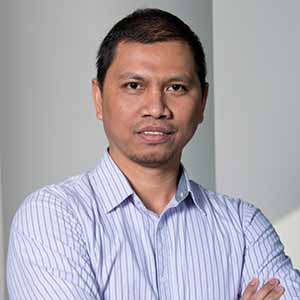
Aslan, Ph.D.'17
Forest Ecosystem Manager and Sustainable, Conservation & Utilization Programme Coordinator, Kehati Indonesian Biodiversity Foundation

Eunha Hoh, Ph.D.'06
Associate Professor, Division of Environmental Health, San Diego State University
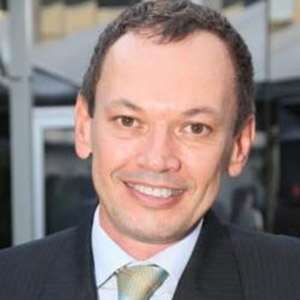
Mateus Batistella, Ph.D.'01
Director, EMBRAPA Satellite Monitoring Campinas, Brazil
Paul H. O’Neill School of Public and Environmental Affairs social media channels
- Give to the O’Neill School
Additional links and resources
Overview of the PhD Program
For specific information on the Environmental Science and Engineering PhD program, see the navigation links to the right.
What follows on this page is an overview of all Ph.D. programs at the School; additional information and guidance can be found on the Graduate Policies pages.
General Ph.D. Requirements
- 10 semester-long graduate courses, including at least 8 disciplinary. At least 5 of the 10 should be graduate-level SEAS "technical" courses (or FAS graduate-level technical courses taught by SEAS faculty), not including seminar/reading/project courses. Undergraduate-level courses cannot be used. For details on course requirements, see the school's overall PhD course requirements and the individual program pages linked therein.
- Program Plan (i.e., the set of courses to be used towards the degree) approval by the Committee on Higher Degrees (CHD).
- Minimum full-time academic residency of two years .
- Serve as a Teaching Fellow (TF) in one semester of the second year.
- Oral Qualifying Examination Preparation in the major field is evaluated in an oral examination by a qualifying committee. The examination has the dual purpose of verifying the adequacy of the student's preparation for undertaking research in a chosen field and of assessing the student's ability to synthesize knowledge already acquired. For details on arranging your Qualifying Exam, see the exam policies and the individual program pages linked therein.
- Committee Meetings : PhD students' research committees meet according to the guidelines in each area's "Committee Meetings" listing. For details see the "G3+ Committee Meetings" section of the Policies of the CHD and the individual program pages linked therein.
- Final Oral Examination (Defense) This public examination devoted to the field of the dissertation is conducted by the student's research committee. It includes, but is not restricted to, a defense of the dissertation itself. For details of arranging your final oral exam see the Ph.D. Timeline page.
- Dissertation Upon successful completion of the qualifying examination, a committee chaired by the research supervisor is constituted to oversee the dissertation research. The dissertation must, in the judgment of the research committee, meet the standards of significant and original research.
Optional additions to the Ph.D. program
Harvard PhD students may choose to pursue these additional aspects:
- a Secondary Field (which is similar to a "minor" subject area). SEAS offers PhD Secondary Field programs in Data Science and in Computational Science and Engineering . GSAS lists secondary fields offered by other programs.
- a Master of Science (S.M.) degree conferred en route to the Ph.D in one of several of SEAS's subject areas. For details see here .
- a Teaching Certificate awarded by the Derek Bok Center for Teaching and Learning .
SEAS PhD students may apply to participate in the Health Sciences and Technology graduate program with Harvard Medical School and MIT. Please check with the HST program for details on eligibility (e.g., only students in their G1 year may apply) and the application process.
In Environmental Science & Engineering
- Undergraduate Engineering at Harvard
- Concentration Requirements
- How to Declare
- Who are my Advisors?
- Sophomore Forum
- ABET Information
- Senior Thesis
- Research for Course Credit (ES 91R)
- AB/SM Information
- Peer Concentration Advisors (PCA) Program
- Student Organizations
- How to Apply
- PhD Timeline
- PhD Model Program (Course Guidelines)
- Qualifying Exam
- Committee Meetings
- Committee on Higher Degrees
- Guidelines for Advisor-Student Discussions
- Research Interest Comparison
- Collaborations
- Cross-Harvard Engagement
- Clubs & Organizations
- Centers & Initiatives
- Alumni Stories
Environmental Sciences Ph.D. (EVS) Program
Environmental sciences ph.d. (evs) , concentrations in agriculture, biology, chemistry, geosciences, & integrated research.
GRE is now waived for the Environmental Sciences PhD program
About the Environmental Sciences Doctoral Program
The School of Environmental Studies offers an interdisciplinary Ph.D. program that will help you reach your career goals in the extensive fields of environmental science.
Our Ph.D. program endeavors to be more than a traditional "academic" program. The interdisciplinary faculty works with our graduate students to develop the critical thinking necessary to solve critical, real world problems.
Ph.D. Concentrations in Agriculture, Biology, Chemistry, Geosciences, and Integrated Research
The program offers five concentrations of study - Agriculture, Biology, Chemistry, Geosciences, and Integrated Research and also addresses environmental impacts on society and culture. Course work in agriculture, geology and sociology are included as core courses outside the selected concentration.
- This cross-disciplinary approach prepares graduates for the 21st century workforce as projected by studies conducted by the National Science Foundation (NSF) and National Academy of Sciences (NAS).
- If you have a Masters degree in either Agriculture, Biology, Chemistry or Geosciences, you can potentially complete your coursework in as little as 25 credit hours and the program in as little as three years!
Program Mission
The Environmental Sciences Ph.D. program's mission is to advance scholarly knowledge and promote leadership necessary to effectively address environmental problems by incorporating multiple perspectives from the sciences and other disciplines in the program's teaching and research activities.
- As an effective interdisciplinary scientist, it is essential to understand the impact of our human endeavors on the environment we inhabit.
- Our program's approach insures that students become aware of a wide range of environmental concerns with emphasis on solving complex environmental problems and that their research includes a breadth of environmental understanding beyond the boundaries of a particular discipline.
- This broader understanding allows our students the ability to design effective means of protecting human health and wildlife habitat for the future and gives insight for options related to undoing the consequences of past environmental neglect.
- The ultimate goal of the program is to prepare students for careers in research, management, government service, teaching, and other areas where they can make productive contributions to the solution of environmental problems.
General Degree Requirements
A student must adhere to all policies and procedures governing graduate study at the University, as contained in the Graduate Catalog and administered by the Vice-President for Research and Graduate Studies.
Requirements:
-A minimum of 61 semester credits of course work, including doctoral research and dissertation as follows:
- A minimum of 43 semester credits of course work beyond the bachelor's degree.
- Courses can be chosen from EVSA 6010, EVSB 6010, EVSC 6010, EVSG 6010, EVSS 6010 (Agriculture, Biology, Chemistry, and Geosciences will choose four out of five options that are not associated with their course of study. The Integrated Research concentration may choose any four of the five options)
- 1 hour of seminar - EVS 7910.
- 12 hours of 7000-level elective courses which are committee recommended.
- 18 hours of research and dissertation.
-Completion of all requirements for the degree, including the dissertation will be completed within a period of eight consecutive years. -Maintenance of a general grade point average of 3.0. -Satisfactory completion of a comprehensive examination. -Satisfactory presentation and defense of a doctoral dissertation.
The Environmental Sciences Ph.D. degree at Tennessee Tech is a research degree requiring an orally defended dissertation.
- School of Environmental Studies: Homepage
- About Environmental Sciences Ph.D. (EVS)
- Agriculture
- Geosciences
- Integrated Research
- Admission, Classification & Candidacy
- Ph.D. Graduate Assistantships
- Program Guidelines
- Ph.D. Forms
- Ph.D. Student Checklist
- Ph.D. Student Orientation
- Ph.D. Research Plan
- Current Students
- Ph.D. Student Publications
- Career Opportunities
- EVS Current Job Openings
COLLEGE OF INTERDISCIPLINARY STUDIES
Follow SOES on Social Media!
Experience Tech For Yourself
Visit us to see what sets us apart.
Quick Links
- Tech at a Glance
- Majors & Concentrations
- Colleges & Schools
- Student Life
- Research at Tech
- Tech Express
- Faculty & Staff
- Mission and Vision
- Facts about Tech
- University Rankings
- Accreditation & Memberships
- Maps & Directions
- Board of Trustees
- Office of the President
- Strategic Plan
- History of Tech
- Parents & Family
- International
- Military & Veteran Affairs
- Tuition & Fees
- Financial Aid
- Visit Campus
- Scholarships
- Dual Enrollment
- Request Information
- Office of the Provost
- Academic Calendar
- Undergraduate Catalog
- Graduate Catalog
- Volpe Library
- Student Success Centers
- Honors Program
- Study Abroad
- Living On Campus
- Health & Wellness
- Get Involved
- Student Organizations
- Safety & Security
- Services for Students
- Upcoming Events
- Diversity Resources
- Student Affairs
- Featured Researchers
- Research Centers
- ttusports.com
- Social Media
- Student Resources
- Faculty & Staff Resources
- Bookstore/Dining/Parking
- Pay Online - Eagle Pay
- IT Help Desk
- Strategic Planning
- Office of IARE
- Student Complaints
Ph.D. in Environmental Policy
General info.
- Faculty working with students: 31
- Students: 13
- Students receiving Financial Aid: 100%
- Part time study available: No
- Application terms: Fall
- Application deadline: December 14
Erika Weinthal Director of Graduate Studies University Program in Environmental Policy Duke University Box 90328 Durham, NC 27708-0328 Phone: (919) 613-8002
Email: [email protected]
Website: https://nicholas.duke.edu/academics/doctoral-degrees
Program Description
The University Program in Environmental Policy (UPEP) is a multidisciplinary, research-focused five-year doctoral degree, intended to prepare candidates for positions in applied academic departments and professional schools (e.g., environment and natural resources, public policy, public administration, international affairs), domestic and international public agencies and environmental organizations, research institutes, and policy consulting firms. Although the program is multidisciplinary, it is designed to ensure that students have strength in a particular social science discipline. Students designate their concentration when applying and currently may select either environmental economics or environmental politics.
Students interested in doctoral studies at Duke can also study the environment from a social science perspective through the disciplinary PhD program in Economics and PhD program in Political Science, and the interdisciplinary PhD program in Marine Science and Conservation. Students interested in an applied social science degree without a specific focus on the environment should apply to the PhD program in Public Policy Studies. Students interested in natural science aspects of the environment should consider the PhD program in Environment, PhD program in Earth and Ocean Sciences, PhD program in Marine Science and Conservation, and PhD program in Ecology.
UPEP is the first and only PhD program in the United States jointly administered by a school of the environment and a school of public policy. It provides a focal point for faculty and graduate students in the Nicholas School of the Environment and the Sanford School of Public Policy who are interested in environmental policy. It draws on the intellectual resources of not only the two schools but also related disciplinary departments (Economics, Political Science) and other professional schools (Law School, Fuqua School, Pratt School of Engineering) at Duke. Faculty in the program conduct research on economic and political aspects of a wide range of topics, including air and water quality, biodiversity conservation, climate change, community resources management, corporate sustainability, ecosystem services, energy, environmental health, fisheries, forests, freshwater, and marine resources, in both U.S. and international contexts. Applicants are encouraged to contact faculty members with related interests to learn more about their current research projects and interest in accepting new doctoral students.
Students in the program:
- A set of common requirements, including courses in the political-economic theory of public policy (PUBPOL 901/902, 6 credits), a series of research workshops leading to the dissertation proposal (ENV 834S, 4.5 credits), and at least one course in environmental/resource economics (3+ credits).
- Disciplinary concentration requirements, including core theory (6+ credits) and research methods (6+ credits) in economics or political science, and corresponding environmental field courses (i.e., environmental economics or environmental politics; (6 credits).
- As needed, appropriate training in natural sciences relevant to the student's research. The level and content of such training is flexible and is worked out in consultation with the student's advisor and committee.
- Regularly attend and participate in one or more research seminars in which faculty and others present their research.
- Attain dissertation status, including meeting qualifying requirements and passing the preliminary exam, by the end of the third year.
- Pass a final examination, which consists of an oral dissertation defense to an approved supervisory committee. This is typically completed by the end of the fifth year. A successful Environmental Policy PhD dissertation must constitute a significant contribution to policy-relevant knowledge, either through innovative application of social science methods to environmental policy problems, or by innovation in theory or methods appropriate for addressing environmental policy problems.
Students normally receive a stipend and a scholarship to cover tuition and fees for up to five years of study if they maintain satisfactory progress toward their degree. Support during the first 2-3 years is usually in return for service as a teaching assistant, with support during the remainder of the program expected to come from research grants managed by a student's major professor. Some students also compete successfully for fellowships offered by the Graduate School and other sources at Duke. Applicants are encouraged to explore external sources of fellowship support (e.g., National Science Foundation) during the application process.
Students in the program can interact with researchers at several centers and institutes at Duke University including the Nicholas Institute for Environmental Policy Solutions, the Center on Global Change, the Duke Global Health Institute, the Social Science Research Institute, the Duke Center for International Development, and the Triangle Census Research Data Center. They can also interact with visiting researchers through two research seminar series supported by UPEP--the Environmental Institutions Seminar Series held at Duke and the regional Triangle Resource and Environmental Economics Seminar Series organized by Duke, North Carolina State University, UNC Chapel Hill, and Research Triangle Institute, along with numerous other seminar series in the Nicholas School, the Sanford School, the Departments of Economics and Political Science, and other Duke schools, departments, institutes, and centers.
- Environmental Policy: PhD Admissions and Enrollment Statistics
- Environmental Policy: PhD Completion Rate Statistics
- Environmental Policy: PhD Time to Degree Statistics
- Environmental Policy: PhD Career Outcomes Statistics
Application Information
Application Terms Available: Fall
Application Deadline: December 14
Graduate School Application Requirements See the Application Instructions page for important details about each Graduate School requirement.
- Transcripts: Unofficial transcripts required with application submission; official transcripts required upon admission
- Letters of Recommendation: 3 Required
- Statement of Purpose: Required
- Résumé: Required
- GRE Scores: GRE General (Optional)
- English Language Exam: TOEFL, IELTS, or Duolingo English Test required* for applicants whose first language is not English *test waiver may apply for some applicants
- GPA: Undergraduate GPA calculated on 4.0 scale required
Writing Sample None required
Additional Requirements: On no more than one page, please briefly highlight the following:
- Your academic preparation and/or professional experience in quantitative methods and skills (e.g. math, statistics, epidemiology). Provide a bulleted list of relevant academic coursework with final grades, and any relevant research projects, extracurricular engagement, experience with software, and/or professional responsibilities
- Your academic and/or professional writing experiences, as evidenced through research papers, an undergraduate thesis, scientific writing courses, or professional writing.
We strongly encourage you to review additional department-specific application guidance from the program to which you are applying: Departmental Application Guidance
List of Graduate School Programs and Degrees
- School of Earth and Sustainability
- Earth Sciences and Environmental Sustainability PhD
School of Earth & Sustainability
Earth sciences and environmental sustainability, doctor of philosophy.
- Available Emphasis Areas:
- Climate and Environmental Change - Emphasis
- Earth Systems - Emphasis
- Ecology, Evolution and Conservation Biology - Emphasis
- Engineering Sustainable Systems - Emphasis
- Environment and Society - Emphasis
Degree Info Tab Open
Requirements tab open, overview tab closed, details tab closed, availability tab closed, requirements accordion open.
To receive a Doctor of Philosophy Degree (PhD) at Northern Arizona University, you must complete a planned group of courses, from one or more disciplines, ranging from at least 60 - 109 units of graduate-level courses. Most plans require research, a dissertation, and comprehensive exams. All plans have residency requirements regarding time spent on the Flagstaff campus engaged in full-time study. The full policy can be viewed here.
Overview Accordion Closed
In addition to University Requirements:
Purpose Statement The Interdisciplinary PhD Program in Earth Sciences & Environmental Sustainability (ESES) brings together students and faculty from across the University. Many ESES topics address questions that can inform decisions and solutions related to environmental issues made by governments, business and society. ESES students produce discipline-specific science and engineering of the highest quality. They strive to integrate different disciplines from the natural sciences, social sciences and engineering to build, connect and communicate knowledge to increase the broader impacts of their research. ESES students study how planet Earth is changing due to natural phenomena and human activities over spatial and temporal scales. They observe, explain, understand, and project trends in earth, environmental, and societal systems, and investigate the drivers and processes that shape natural and social worlds and the interactions between them.
Earth Systems Emphasis This emphasis area will train and educate leaders in rapidly growing industries and academic fields such as natural resources and energy, and in government agencies that require PhD-level researchers to inform policy decisions on some of the greatest problems facing society.
Climate and Environmental Change Emphasis This emphasis often combines the long-term perspective from geological archives with process-oriented investigations of today, with the goal of integrating a field-based understanding of natural systems into predictive models to support sustainable resource management in the face of climate change.
Engineering Sustainable Systems Emphasis This emphasis is designed for engineers who are interested in understanding the economic, societal and environmental implications of engineering systems. It provides a strong background in engineering enhanced by understanding future sustainability of our environment, and will prepare you for careers in academia, industry, and governmental organizations.
Ecology, Evolution and Conservation Biology Emphasis This emphasis will train and educate leaders in areas of research and application at the cutting edge of conservation and sustainability professions, including basic research, management decision-making, sustainable policy development, and applied conservation.
Environment and Society Emphasis This emphasis will prepare leaders in the areas of natural resources management, community engagement, the non-profit/NGO sector, academia, and in government agencies that require PhD-level researchers to inform management and policy decisions that address some of the greatest environmental problems facing society today.
Student Learning Outcomes ESES students will select one of the following three emphasis areas, based upon their background and the work they will complete toward their dissertation: Earth Systems Emphasis
- Advance cutting-edge research in the Earth sciences.
- Increase knowledge in the critical areas for society of energy, natural resources, water, and natural hazards.
- Apply this knowledge in areas that bridge the geosciences with physics, chemistry, engineering, and biology.
- Advance new understandings of natural climate variability.
- Improve projections of climate change and its impacts on ecosystems and their hydrological and geological underpinnings.
- Inform policy decisions about how best to manage natural resources under changing climate and related environmental stresses.
- Advance engineering analysis and applications relevant to sustainable development.
- Improve the efficiency and effectiveness of engineering processes, products, and education.
- Understand and apply their knowledge in the sustainability contexts of economic viability, environmental compatibility and sustainability, societal impacts and policy development and implications.
- Advance the frontiers of understanding of ecological and evolutionary processes.
- Synthesize applied, empirical, or experimental work from multiple disciplines to confront integrative challenges at the cutting edge of applied and basic research.
- Apply ecological, evolutionary, and conservation theory to conservation challenges, incorporating the human dimensions of sustainable management and policy.
- Advance knowledge in social theory and environmental policy related to sustainability.
- Conduct cutting-edge interdisciplinary research at the nexus of the natural and social sciences.
- Apply this knowledge in decision making for sustainable resource management and socio-economic policies.
Details Accordion Closed
Graduate admission information.
The NAU graduate online application is required for all programs. Admission to many graduate programs is on a competitive basis, and programs may have higher standards than those established by the Graduate College. Admission requirements include the following:
- Transcripts.
- Undergraduate degree from a regionally accredited institution with a 3.0 GPA on a 4.0 scale ("A" = 4.0), or the equivalent.
Visit the NAU Graduate Admissions website for additional information about graduate school application deadlines, eligibility for study, and admissions policies. Ready to apply? Begin your application now.
International applicants have additional admission requirements. Please see the International Graduate Admissions Policy .
Additional Admission Requirements
Individual program admission requirements over and above admission to NAU are required.
- GRE® revised General Test
- Three letters of recommendation
- A writing sample
- A personal statement or essay
- Resume or curriculum vitae
Doctoral Requirements
This Doctoral degree requires 60 units distributed as follows:
- Common Courses: 7 units
- Graduate Seminar: 2 units
- Professional Experience: 6 units
- Research Methods Courses: 3 units
- Climate and Environmental Change Emphasis
- Earth Systems Emphasis
- Ecology, Evolution and Conservation Biology Emphasis
- Engineering Sustainable Systems Emphasis
- Environment and Society Emphasis
- Dissertation: 15 units
Take the following 60 units, with a minimum GPA of 3.0:
Common Courses (7 units)
- ENV 555 (3 units)
- EES 605 , EES 606 (2 units)
- ESE 698 School of Earth and Sustainability Seminar Series (2 units)
Graduate Seminar (2 units)
- 698 Graduate Seminar course from any unit (2 units)
Professional Experience (6 units)
- Any experience that significantly broadens knowledge and skills, and advances the student’s career objectives. The requirement can be satisfied through regular course work or through individualized study that expands the student’s skills in an area outside his/her dissertation but in a professional area related to his/her career goals, or research experiences within the context of the dissertation. See an advisor. (6 units)
Research Methods Courses (3 units)
- In consultation with your advisor, select any graduate-level course with significant content in statistics and/or science/engineering research methods. (3 units)
- Emphasis Requirement - Select one (27 units)
Climate And Environmental Change Emphasis (27 units)
- Graduate-level courses with EES, ENV, BIO or FOR prefixes, or other courses that focus on climate or environmental change.
Earth Systems Emphasis (27 units)
- Graduate-level courses with GLG prefix, or other courses that focus on earth systems.
Ecology, Evolution & Conservation Biology Emphasis (27 units)
- ( BIO 577 or ENV 577 or FOR 577 ) (3 units)
- Select one seminar course from: FOR 505 , BIO 698 (1 unit)
- Quantitative: BIO 523 , BIO 580 , BIO 676 , FOR 606 , ( EES 529 or GSP 529 ) or other graduate-level coursework in quantitative ecology at NAU, guided and approved by advisor input.
- Physiological/population/community: BIO 570 , BIO 571 , BIO 573 , BIO 663 , BIO 673 , ENV 540 , FOR 504 , FOR 517 , FOR 520 , FOR 543 , FOR 545 , FOR 550 , FOR 551 , FOR 552 , FOR 553 , FOR 560 , FOR 580 , FOR 582 , FOR 604 , or other graduate-level coursework in physiological, population, or community ecology at NAU, guided and approved by advisor input.
- Ecosystem/global: ( BIO 507 or FOR 507 ), BIO 578 , ENV 571 , FOR 515 , FOR 544 , or other graduate-level coursework in ecosystem/global ecology at NAU, guided and approved by advisor input.
- If electing the Ecology, Evolution & Conservation Biology Emphasis, complete an additional 14 units of graduate-level courses with EES, ENV, BIO or FOR prefixes, or other courses that focus on ecology, evolution and conservation biology.
Engineering Sustainable Systems Emphasis (27 units)
- Graduate-level courses with CENE or ME prefixes, or other courses that focus on engineering sustainable systems.
Environment and Society Emphasis (27 units)
- Graduate-level courses with ECO, EES, ENV, FOR, POS, SOC or SUS prefixes, or other courses that focus on economic, political and social theories and practices related to environmental sustainability.
You may have no more than 6 units of 400-level courses. These 400-level courses cannot have been used to satisfy the requirements for any previous degree program(s). You must get your dissertation committee's approval for any courses taken outside of NAU.
Dissertation (15 units)
- EES 799 for the research, writing, and oral defense of an approved dissertation. You can only count 15 units of dissertation credit toward your degree; however, you may end up taking additional units because you must enroll for it each term while you're working on your dissertation. (15 units)
- Your dissertation committee must approve all of your courses.
Research Requirements In addition to completing 45 units of coursework, you must demonstrate your independence, research skill, and experience in a discipline within earth sciences and environmental sustainability by choosing a problem and research area in consultation with your dissertation committee and then satisfactorily completing a dissertation. Your dissertation research meets our standards when it is soundly based in the theoretical context of the subject, proceeds with a sound design that gives due attention to statistical adequacy, and concludes with findings and inferences set forth within an appropriate theoretical context. Your dissertation must demonstrate that you have mastered your field of specialization, carried out independent scholarly work, and contributed significant new knowledge. You must pass an oral defense of your dissertation.
Comprehensive Exam We also require that you demonstrate written and oral communication skills in English at a level that will allow you to effectively communicate your ideas and knowledge to a wide range of audiences. Part of this demonstration involves comprehensive oral exams by the end of your 4th semester designed to establish your competence in a breadth and depth of subjects within your emphasis area and the larger field of earth sciences and environmental sustainability.
Research Competency Requirement NAU policy for PhD programs includes a research competency requirement that must be satisfied before a student can be admitted to candidacy. This interdisciplinary doctoral program recognizes ENV 555 , EES 605 , and EES 606 , plus one graduate level course with significant content in statistics and/or science/engineering research methods, as meeting this requirement.
Additional Information
Be aware that some courses may have prerequisites that you must also successfully complete. For prerequisite information, click on the course or see your advisor.
Availability Accordion Closed
School of earth & sustainability, social media.
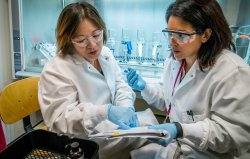
Environmental Science and Management (PhD)
Apply Now Frequently Asked Questions Request Information Upcoming Events Program Website
Environmental Science and Management (PhD) – STEM Designated Degree Program
Established in 2003, Montclair State University’s first-of-its-kind Environmental Science and Management curriculum emphasizes the need for environmental professionals to be fluent in the natural and physical sciences, statistics, economics, and policy. This knowledge and skill set is necessary for environmental managers to serve as generators of new knowledge, and also as interpreters and ambassadors between the diverse stakeholders involved in environmental issues.
Now more than ever, the world needs highly trained, dedicated environmental professionals who understand the intricate mechanisms that cause climate change and its impacts on our society, propagation of contaminants in air, soil, and water, flooding, coastal erosion, and loss of natural habitats and biodiversity. The world needs scientists who are able to design and implement solutions, communicate these effectively to stakeholders, and raise the scientific literacy of the public. Our students prepare for this career path through a combination of interdisciplinary coursework and research in regional to international study areas, on topics addressing climate change, soil and water quality, environmental remediation, biofuels markets, stormwater management, natural resource management, coastal management, and protecting biodiversity and ecosystem services. Our alumni are employed as professors in U.S. and international universities, as scientists and managers in municipal, state, and federal agencies, as environmental consultants, and as scientists in private industries.
For more information on the program, visit the Environmental Science and Management (PhD) listing on the College of Science and Mathematics website .
Please refer to our programs of study page for a comprehensive list of all of the graduate programs offered within the university.
Successful applicants must have a bachelors degree from an accredited institution with an undergraduate grade point average of at least 3.0 or higher on a 4.0 scale and/or a masters degree with a graduate grade point average of at least 3.3 or higher on a 4.0 scale. Applicants with non-U.S. degrees, please visit the International Applicants page to review the U.S. degree equivalency information. Prospective students are strongly encouraged to contact possible research advisors and research projects prior to submitting an application and solicit letters of reference from university faculty who can specifically address your potential to conduct doctoral-level research.
In order to make applying for graduate school as seamless as possible for you, we have created an application checklist. This checklist can be a reference point for you during the application process to ensure that you have a comprehensive understanding of the steps needed to apply, as well as all corresponding supplemental materials for your specific program of interest.
- Fall Admission: March 1st
- Spring Admission: October 31st
Please note: Upon offer of admission, you will be asked to submit an enrollment deposit of $200.
- Submit Online Application: Please create your online account and submit your application by following the general application instructions and pay (or waive) the non-refundable $60 application fee. Once this step has been completed, the online portal will allow you to upload your supplemental materials.
The following is a list of the supplemental materials that will accompany your application for the Environmental Science and Management (PhD) program:
- Transcript: One from each college attended.
- General Statement of Purpose: The Statement of Purpose provides you an opportunity to give evidence of your unique talents and experiences as an applicant to doctoral study at Montclair State University. In preparing your statement, please keep in mind that the Admissions Committee is seeking evidence of your ability to communicate clearly and professionally. Please include your reasons for pursuing doctoral studies by referring to relevant personal, academic and work experiences. Please also outline your future plans and any other information that may be of interest to the Admissions Committee.
- General Statement of Research/Inquiry: The Statement of Research/Inquiry provides you an opportunity to inform the Admissions Committee of your thoughts, ideas, and areas of interest that may lead to dissertation research. In preparing your statement, please keep in mind that the Admissions Committee is seeking evidence of your ability to communicate clearly and professionally. The Statement of Research/Inquiry should be 1-3 pages, double-spaced, and typewritten. It is key to identify at least one member of the doctoral faculty who will agree to serve as your PhD advisor and to mention this in your Research Statement. Use this list to identify doctoral faculty advisors that align with your proposed research area. It is strongly suggested that you get in touch with any prospective advisor(s) to discuss your proposed PhD research, via phone or Zoom.
- Resume: Required.
- Letters of Recommendation: Three.
- Standardized Test Scores: GRE Not Required. Applicants have the option of submitting GRE scores. Any applicant voluntarily choosing to do so should select Montclair State University as the receiving institution on their score report.
- Applicants with non-U.S. degrees, please visit the International Applicants page to review the US degree equivalency information.
Our program consists of 72 credits, evenly distributed between coursework and research. Please note that as the Montclair State University faculty grows, new expertise and new courses are constantly developed and added to our extensive list of electives. For more information, please visit the Environmental Science and Management (PhD) program listing in the University Catalog.
If you have any general questions regarding the application process and requirements, please email or call us: Office of Graduate Admissions Email: [email protected] Telephone: 973-655-5147 Fax: 973-655-7869
If you have specific inquiries regarding your program of interest, please contact the Environmental Science and Management (PhD) Program Coordinator:
*During the summer months, there will be a rotating department chair available to answer your inquiry. Find the updated summer chair for this program .*
Program Director: Dr. Mark Chopping Office: Center for Environmental and Life Sciences 312 Email: [email protected] Telephone: 973‑655‑7384
Online PhD in Climate Change and Sustainability
@ EUCLID | An Intergovernmental University An affordable, fully online doctoral program with an intergovernmental mandate and proven track-record of training world-class diplomats and experts. Breadcrumbs: Home (Direct Links) | DCCS Landing Page Related EUCLID program: https://www.euclid.int/online_phd_energy/ EUCLID Programs page: https://www.euclid.int/degreecourses.asp?DegreeIndex=91
EUCLID (Pôle Universitaire Euclide | Euclid University), an international intergovernmental organization with university mandate, offers to intergovernmental and national civil servants (as well as select students from the general public) a specialized external degree program called the EUCLID Online Ph.D. in Climate Change and Sustainability (DCCS) . This field of study or specialization covers the full scope of climate-related issues from a policy perspective. It is the only fully online PhD program in this field organized by an intergovernmental ( treaty-based ) organization and officially used by diplomats and civil servants over 4 continents. Alumni, students and faculty include current and former ambassadors, minister- counsellors, etc.

Become an Expert
EUCLID provides comprehensive training cover both the academic as well as professional aspects of a doctoral-level program, including: academic writing (journal publications), grant-writing, communications technologies, resume building, etc.
Academic Presentation
EUCLID's Ph.D. in Climate Change and Sustainability represents 90 US credits (120 ECTS) of coursework beyond the Bachelor's. In practice, students may enter the program with a relevant Master's degree, complete 30 to 35 US credits of core doctoral courses, followed by the actual writing of the dissertation in 5 phases. The resulting thesis should be a publishable book offering a clear contribution to the field and establishing the author as a subjet-matter expert.
Focus & Specializations
Among the suggested areas of focus are: - Climate Change diplomacy - Small Islands / Small States issues - Cosmic Cycle approaches - International and treaty law - Sustainable development - IGOs and non-governmental organizations - Nation-specific dissertations.
Admissions + Program Brochure
For more information on a specific point, please contact the admissions office. applicants should have a master’s degree or its international equivalent, awarded by a recognized institution (usually listed in the unesco-iau whed system or handbook). fluency in english (spoken and written) is required and will be tested. students are expected to be in position to dedicate 10 to 15 effective hours of study on a weekly basis..

- Credits: About 55
- Duration: 3 years
Entire Program
With scholarship.
- IGO staff; ECOWAS residents
@ EUCLID: An Extraordinary Network of Memberships and Participations

United Nations
EUCLID's founding treaty is registered and sealed in the United Nations Treaty Series (multilateral 49006/7)

The EUCLID Secretary General is a full member of the International Association of University Presidents
Member (SG)

EUCLID is a formal party to the IACA Agreement (treaty) along with more than 80 UN Member States

EUCLID is an associate member of the International Network for Quality Assurance Agencies in Higher Education

EUCLID is a member of the Academic Council on the United Nations System

EUCLID is a member of the United Nations Academic Impact initiative

EUCLID is a member of the Association of African Universities

EUCLID is a member of the Association of Universities of Asia and the Pacific
Select Courses from Program Curriculum
More information.

Faculty Profiles | Link
Meet EUCLID's dedicated faculty members including active diplomats and active or retired senior government officials.

Alumni Profiles | Link
EUCLID alumni constitute a high-level global network active at the United Nations and many national governments.

Institutional Brochure | Link
Access both EUCLID's institution brochure and annual reports as well as this program's dedicated programmatic presentation in PDF format.

Institutional Recognition | Link
As an intergovernmental, treaty-backed public institution, EUCLID stands out in a crowded field of for-profit or purely national institutions of higher learning.
'EUCLID: Providing university-level training for staff of the world's foremost institutions'
Current and past students/alumni are employed by the world's foremost institutions, including:.

The world's foremost intergovernmental organization: www.un.org

US Government
Students working for US Federal Agencies including the State Dpt: www.state.gov

European Investment Bank
A major multilateral financial institutions: www.eib.org

Swiss Armed Forces
Swiss excellence, at its pinnacle international peace-keeping: www.ch.ch

The UN specialized agency serving children's needs globally: www.unicef.org

The UN specialized agency based in Geneva, serving and monitoring global health: www.who.int

Catholic Church
One of the world's oldest and most influence institutions: www.vatican.va
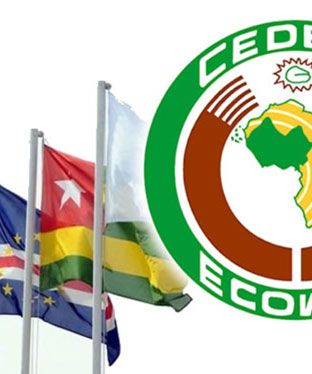
A major regional block for economic and political integration: www.ecowas.int
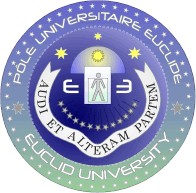
EUCLID Climate Studies Center and Liaison Office 450 Rue Baden Powell 34000 Montpellier FRANCE
Email: [email protected] Phone: +33 (0) 4 67 69 74 13 Offices: Montpellier FR, Bangui CF, Banjul GM, Washington US
EUCLID (.int) Informations Légales Nous contacter
© 2008-2021 EUCLID (Pôle Universitaire Euclide / Euclid University) and IOSD (International Organization for Sustainable Development) - Tous droits réservés - All Rights Reserved
- Skip to Content
- Catalog Home
- Soil Science, PhD

The UW–Madison Department of Soil and Environmental Sciences is one of the oldest, largest, and most prominent soil science departments in the United States. It is globally renowned for its excellence in soil research and education. The department's mission is to provide instruction, research, and extension leadership in soil chemistry, physics, biology, and pedology to economic and sustainable land use. Programs are designed to improve basic understanding and practical management of soil resources in natural, agricultural, and urban ecosystems, and to serve local, state, national, and global interests. The department implements the Wisconsin Idea to the extended community and provides all generations with an appreciation of soil as a key natural resource and thorough understanding of the scientific basis of the environment and agriculture.
Soil science entails understanding soils and applying the principles of physics, chemistry, mathematics, and biology to the sustainable management of soil and the environment. Soil science deals with the effects of climate change and its interaction with the soil, with scarcity of water resources, and the increase of food production to feed 9 billion people. The link between soils and biodiversity as well as the effects of soils on biofuel production is widely researched in the Department of Soil and Environmental Sciences.
The department is committed to integrated programs of instruction, research, extension, and outreach that address societal goals of responsible stewardship of soil and water resources.
The importance of soils in crop production, environmental issues, turf and grounds management, soil conservation, global climate change, carbon sequestration, rural and urban planning, and waste disposal are integrated into the department's course offerings and research programs. Graduate study in soil science provides the basic and applied scientific training needed for teaching, research, and other professional work in the agricultural, earth, and environmental sciences. The department office provides information concerning career placement and available vacancies.
Graduates from the department occupy leading positions in industry, government, education, and research in agriculture, natural resources, and environmental science throughout the world. Of the more than 1,000 alumni of the department's graduate program, many are deans, directors, chairs, faculty, and staff at universities in the U.S. and other countries, or in leading positions in government, regulatory agencies, research institutions, agribusinesses, chemical industries, and recreational and conservation organizations.
The number of graduate students enrolled in the program over the past 10 years has averaged 20 per year, with about half pursuing master's degrees and half pursuing doctorates. International students generally comprise about 30% of the total. Department faculty also direct additional graduate students in multidisciplinary research in soils-related programs.
Faculty Research
Research in the department focuses on an improved understanding of the soil, as well as on interactions between soil and the people of Wisconsin. The faculty have extensive and long-term experience and knowledge about the soils of Wisconsin, their genesis, properties, and management. The department has an exciting suite of research activities ranging from the molecular level to the global. Research focuses on topical themes like climate change and soil changes to land use effects of biofuel production to DNA fingerprinting of soil life.
Many field research projects on soil and water problems are conducted in cooperation with state and federal agencies, agribusinesses, municipalities, and private farmers. The department cooperates closely with the Wisconsin Geological and Natural History Survey, Molecular and Environmental Toxicology Center, and the USDA Natural Resource Conservation Service in conducting soil surveys and addressing problems of groundwater shortages and contamination. Relationships between soils and forests are studied at tree nurseries and in state, private, and commercial forests throughout the state in cooperation with the Wisconsin Department of Natural Resources and the pulp and paper industry.
Through a long commitment of our staff to international agriculture, the department has assisted in the creation of agricultural colleges in several developing countries and has attracted outstanding international graduate students. Current research involvement includes Brazil, Chile, China, Trinidad-Tobago, Spain, Australia, Argentina, and Antarctica.
Many department faculty have been recognized nationally and globally for their contributions to soil science. Three of only four soil scientists appointed to the National Academy of Sciences are from the UW–Madison Department of Soil and Environmental Sciences. Several faculty members have received local and national academic, professional-society, trade-association, and industrial prizes and awards for teaching, research, and extension education and serve on important state, national, and international committees. Many faculty members have been recognized for their contributions by election to honorary fellowship in the Soil Science Society of America, the American Society of Agronomy, and allied professional societies.
Our faculty are heavily involved in cooperative interdisciplinary research undertakings with scientists and organizations within and beyond the university, such as UW–Madison's Gaylord Nelson Institute for Environmental Studies, Molecular and Environmental Toxicology Center, Environmental Chemistry and Technology Program, and other science departments, state agencies, environmental consulting and service companies, agribusinesses, and trade organizations.
Research Facilities
Research in the department can be conducted in the field, in the laboratory, and behind the desktop, but is commonly conducted in a combination. The department is equipped with all necessary laboratory, computing, and field facilities for graduate training and research. State-of-the-art scientific instrumentation includes soil moisture tension apparatus; flame-emission and atomic-absorption spectrophotometers and gamma-ray spectrometers; neutron activation analysis equipment; an inductively coupled plasma (ICP)-emission spectrometer and an ICP-mass spectrometer; thin-layer, high-performance liquid, gas, and ion chromatographs; low-mass isotope ratio mass spectrometer; micro-respirometers; micro-titer-plate counters; infrared and ultraviolet spectrophotometers; phase-contrast, polarizing and epifluorescence microscopy and photomicrography equipment; eddy correlation systems for heat, moisture, and CO2 fluxes; ground-penetrating radar; high-resolution digital imaging; dynamic light scattering and particle electrophoresis equipment; flow field flow fractionation; and accelerated solvent extractor. Field equipment includes a truck-mounted hydraulic soil probe with well-drilling capabilities; a plot-field harvest combine; various production field equipment (planters, tillage equipment, rainfall simulator); differential-global position system; and particle counter.
Excellent data collection, data logging, computing, and networking facilities are available for basic research and graduate training. In addition to computing facilities maintained by individual researchers for their students, the department makes available to its graduate students a computer graphics facility for the production of sophisticated graphic output.
Specialized facilities are available for research in molecular biology, modern environmental microbiology, in vitro toxicology and bioassays, and contaminated-site remediation. Soils graduate students and faculty have shared access to major advanced physicochemical, x-ray, and electron microscopy analytical equipment through the Materials Science Center, National Magnetic Resonance Facility at Madison, National Synchrotron Light Source at Brookhaven National Laboratories, and other UW–Madison science and engineering departments. Facilities, vehicles, machinery, and instrumentation are available for conducting field experiments at ten strategically located UW Agricultural Research Stations and the O.J. Noer Turfgrass Research and Education Facility. Fieldwork for agricultural production and environmental protection is supported by daily information from the CALS agricultural weather station network as well as soils, crops, land-use, and natural resources analysis using land information systems and geographic information systems.
Please consult the table below for key information about this degree program’s admissions requirements. The program may have more detailed admissions requirements, which can be found below the table or on the program’s website.
Graduate admissions is a two-step process between academic programs and the Graduate School. Applicants must meet the minimum requirements of the Graduate School as well as the program(s). Once you have researched the graduate program(s) you are interested in, apply online .
Suggested Preparatory Coursework
A foundation in the basic sciences is essential for graduate study in soil science. Continuing undergraduate students are encouraged to select undergraduate courses carefully if they are considering advanced degrees in soil science. The program recommends applicants complete the suggested preparatory coursework (or equivalent) listed below. Admission without this suggested preparation is possible but may delay the completion of graduate studies. If this preparatory coursework has not been completed prior to admission, a student’s examination committee and/or advisor may require this coursework be completed during the PhD program depending on the student's academic, research, and career goal needs.
Graduate School Resources
Resources to help you afford graduate study might include assistantships, fellowships, traineeships, and financial aid. Further funding information is available from the Graduate School. Be sure to check with your program for individual policies and restrictions related to funding.
Program Resources
Financial support is usually available to qualified students in the form of research assistantships, mostly funded from research grants; final decision for granting a research assistantship rests with the professor(s) supervising the research. Any assistantship for at least one-third time qualifies a student for remission of tuition (though students may be responsible for other administrative fees). The department does not offer teaching assistantships. A number of Graduate School fellowships are available to new students with outstanding records. The deadline for application for these competitive fellowships is early January of each year. The department selects the most qualified applicants and forwards their dossiers to a campus-wide selection committee. Support for graduate assistantships is available through two Wisconsin Distinguished Fellowships (the W.R. Kussow/Wisconsin Turfgrass Association and the Leo M. Walsh/Wisconsin Fertilizer and Chemical Association), the C.B. Tanner Agricultural Physics Award Fund, and the Charles and Alice Ream Soil and Water Protection Research Fund. In addition, there are two awards given annually to outstanding incoming graduate students, the O.N. Allen Graduate Fellowship for Agriculture and the Kelling Soil Fertility Award.
Minimum Graduate School Requirements
Review the Graduate School minimum academic progress and degree requirements , in addition to the program requirements listed below.
Major Requirements
Mode of instruction, mode of instruction definitions.
Accelerated: Accelerated programs are offered at a fast pace that condenses the time to completion. Students typically take enough credits aimed at completing the program in a year or two.
Evening/Weekend: Courses meet on the UW–Madison campus only in evenings and/or on weekends to accommodate typical business schedules. Students have the advantages of face-to-face courses with the flexibility to keep work and other life commitments.
Face-to-Face: Courses typically meet during weekdays on the UW-Madison Campus.
Hybrid: These programs combine face-to-face and online learning formats. Contact the program for more specific information.
Online: These programs are offered 100% online. Some programs may require an on-campus orientation or residency experience, but the courses will be facilitated in an online format.
Curricular Requirements
Required courses.
Students who take SOIL SCI/F&W ECOL 451 Environmental Biogeochemistry may count it as either Soil Chemistry or Soil Biology credits, but it cannot count towards both categories.
All PhD candidates must present at least two seminars in SOIL SCI 728 . One of the seminars must be on the student's prospectus.
All candidates pursuing a Soil Science PhD shall complete a minimum of 1 credit of SOIL SCI 799 . A written plan for satisfying this requirement shall be prepared by the student in conjunction with the advisor and approved by the Certification Committee. The type and level of effort required to earn one or more degree credits in SOIL SCI 799 shall be in accordance with the guidelines and standards set forth by the CALS Curriculum Committee and approved by the UW Divisional Committees in the Spring Semester 1981.
PhD candidates are required to enroll in at least 1 credit of SOIL SCI 990 every semester.
Graduate School Policies
The Graduate School’s Academic Policies and Procedures provide essential information regarding general university policies. Program authority to set degree policies beyond the minimum required by the Graduate School lies with the degree program faculty. Policies set by the academic degree program can be found below.
Major-Specific Policies
Prior coursework, graduate credits earned at other institutions .
With program approval, students are allowed to count up to 12 credits of graduate coursework taken during graduate study at other institutions. Coursework earned ten or more years prior to admission to a doctoral degree is not allowed to satisfy requirements. Students may petition the department for an appeal of the ten-year limit on a case-by-case basis.
Undergraduate Credits Earned at Other Institutions or UW-Madison
With program approval, students are allowed to count up to 7 credits of graduate coursework numbered 300 or above from a UW–Madison undergraduate degree. The coursework may also count toward the 50% graduate coursework requirement if the courses are numbered 700 or above. Coursework earned ten or more years prior to admission to a doctoral degree is not allowed to satisfy requirements. Students may petition the department for an appeal of the ten-year limit on a case-by-case basis.
Credits Earned as a Professional Student at UW-Madison (Law, Medicine, Pharmacy, and Veterinary careers)
Refer to the Graduate School: Transfer Credits for Prior Coursework policy.
Credits Earned as a University Special student at UW-Madison
With program approval, students are allowed to count up to 15 credits of coursework numbered 300 or above taken as a UW–Madison University Special student. The coursework may also count toward the 50% graduate coursework requirement if the courses are numbered 700 or above. Coursework earned ten or more years prior to admission to a doctoral degree is not allowed to satisfy requirements. Students may petition the department for an appeal of the ten-year limit on a case-by-case basis.
Refer to the Graduate School: Probation policy.
Advisor / Committee
The Doctoral Committee, chosen by the student and major professor, is a committee of four or more members representing more than one graduate program, three of whom must be UW-Madison graduate faculty or former UW-Madison graduate faculty up to one year after resignation or retirement. At least one of the four members must be from outside of the student’s major program or major field (often the minor field) and approved by the Certification Committee. A minimum of two must be from the Soil Science faculty. At least three committee members must be designated as readers. Representation of the Minor Department (see Graduate Minor Requirements in the handbook) is at the option of the Minor Department, but the Department of Soil Science recommends that the Minor Professor be on the Committee.
The required fourth member of the Doctoral Committee, as well as any additional members, all retain voting rights. They may be from any of the following categories, as approved by the executive committee: graduate faculty, faculty from a department without a graduate program, academic staff (including emeritus faculty), visiting faculty, faculty from other institutions, scientists, research associates, and other individuals deemed qualified by the Executive Committee (or its equivalent) provided the individual has a PhD degree or its equivalent.
It is the responsibility of the student and the Major Professor to form a Doctoral Committee and schedule a meeting before the end of the second semester (not including summer sessions) of PhD graduate work.
A student who does not meet deadline requirements in this document will not be allowed to register in the subsequent semester until a written plan for meeting the requirements has been approved by their major advisor and the department Certification Committee.
Credits Per Term Allowed
Time limits.
Prospectus: The written prospectus and the prospectus seminar must be completed by the end of the third semester (not including summer sessions).
Preliminary exam: Students who obtain their MS degree in the department and who continue in the department for their doctorate must take the preliminary examination by the end of the fourth semester (not including summer sessions) of PhD graduate work. Candidates who are approved to retake a failed examination must have passed by the end of the fifth semester.
Candidates for the PhD degree who obtained an MS or MA degree elsewhere, must take the Preliminary Examination by the end of the fourth semester (not including summer sessions) of PhD graduate work. Candidates who are approved to retake a failed examination must have passed by the end of the fifth semester.
Candidates who do not adhere to this deadline must show justification for the delay to the department certification committee.
Final oral exam and deposit of dissertation: A candidate for a doctoral degree who fails to take the final oral examination and deposit the dissertation within five years after passing the preliminary examination may by require to take another preliminary examination and to be admitted to candidacy a second time.
Grievances and Appeals
These resources may be helpful in addressing your concerns:
- Bias or Hate Reporting
- Graduate Assistantship Policies and Procedures
- Office of the Provost for Faculty and Staff Affairs
- Employee Assistance (for personal counseling and workplace consultation around communication and conflict involving graduate assistants and other employees, post-doctoral students, faculty and staff)
- Employee Disability Resource Office (for qualified employees or applicants with disabilities to have equal employment opportunities)
- Graduate School (for informal advice at any level of review and for official appeals of program/departmental or school/college grievance decisions)
- Office of Compliance (for class harassment and discrimination, including sexual harassment and sexual violence)
- Office Student Assistance and Support (OSAS) (for all students to seek grievance assistance and support)
- Office of Student Conduct and Community Standards (for conflicts involving students)
- Ombuds Office for Faculty and Staff (for employed graduate students and post-docs, as well as faculty and staff)
- Title IX (for concerns about discrimination)
College of Agricultural and Life Sciences: Grievance Policy
In the College of Agricultural and Life Sciences (CALS), any student who feels unfairly treated by a member of the CALS faculty or staff has the right to complain about the treatment and to receive a prompt hearing. Some complaints may arise from misunderstandings or communication breakdowns and be easily resolved; others may require formal action. Complaints may concern any matter of perceived unfairness.
To ensure a prompt and fair hearing of any complaint, and to protect the rights of both the person complaining and the person at whom the complaint is directed, the following procedures are used in the College of Agricultural and Life Sciences. Any student, undergraduate or graduate, may use these procedures, except employees whose complaints are covered under other campus policies.
- The student should first talk with the person at whom the complaint is directed. Most issues can be settled at this level. Others may be resolved by established departmental procedures.
- If the complaint involves an academic department in CALS the student should proceed in accordance with item 3 below.
- If the grievance involves a unit in CALS that is not an academic department, the student should proceed in accordance with item 4 below.
- If informal mediation fails, the student can submit the grievance in writing to the grievance advisor within 10 working days of the date the student is informed of the failure of the mediation attempt by the grievance advisor. The grievance advisor will provide a copy to the person at whom the grievance is directed.
- The grievance advisor will refer the complaint to a department committee that will obtain a written response from the person at whom the complaint is directed, providing a copy to the student. Either party may request a hearing before the committee. The grievance advisor will provide both parties a written decision within 20 working days from the date of receipt of the written complaint.
- If the grievance involves the department chairperson, the grievance advisor or a member of the grievance committee, these persons may not participate in the review.
- If not satisfied with departmental action, either party has 10 working days from the date of notification of the departmental committee action to file a written appeal to the CALS Equity and Diversity Committee. A subcommittee of this committee will make a preliminary judgement as to whether the case merits further investigation and review. If the subcommittee unanimously determines that the case does not merit further investigation and review, its decision is final. If one or more members of the subcommittee determine that the case does merit further investigation and review, the subcommittee will investigate and seek to resolve the dispute through mediation. If this mediation attempt fails, the subcommittee will bring the case to the full committee. The committee may seek additional information from the parties or hold a hearing. The committee will present a written recommendation to the dean who will provide a final decision within 20 working days of receipt of the committee recommendation.
- If the alleged unfair treatment occurs in a CALS unit that is not an academic department, the student should, within 120 calendar days of the alleged incident, take his/her grievance directly to the Associate Dean of Academic Affairs. The dean will attempt to resolve the problem informally within 10 working days of receiving the complaint. If this mediation attempt does not succeed the student may file a written complaint with the dean who will refer it to the CALS Equity and Diversity Committee. The committee will seek a written response from the person at whom the complaint is directed, subsequently following other steps delineated in item 3d above.
Financial support is available to qualified MS and PhD students in the form of research assistantships. Most assistantships are funded through research grants, and the final decision rests with the professor(s) supervising the research. A research assistantship for at least one-third time qualifies a student for remission of all tuition. The department offers a limited number of teaching assistantships. Graduate School fellowships are also available.
- Professional Development
Take advantage of the Graduate School's professional development resources to build skills, thrive academically, and launch your career.
UW–Madison offers a wealth of resources intended to enrich your graduate studies and enhance your professional skills. Starting your very first year on campus, it is expected that you will take full advantage of the career and professional development resources that best fit your needs and support your goals. Since our alumni thrive not only in academia but also in industry, corporate, government, and non-profit arenas, we strive to be in tune, holistic, and innovative in our approach to meeting the diverse professional development needs of our students. By actively participating in these professional development opportunities, you will build the skills needed to succeed academically at UW–Madison and to thrive professionally in your chosen career.
- Learning Outcomes
- Articulates research problems, potentials, and limits with respect to theory and practice in soil science.
- Formulates ideas, concepts, designs, and/or techniques beyond the boundaries of soil science knowledge.
- Articulates testable hypotheses and conducts research that makes a substantive contribution to soil science.
- Communicates clearly in ways appropriate to the field, in oral and written forms, for scholarly and general public audiences.
- Fosters ethical and professional conduct, adhering to accepted standards such as that of the Soil Science Society of America.
Dr. Francisco Arriaga
Applied Soil Physics, Soil and Water Management and Conservation: Conservation agriculture systems; development of conservation tillage practices that enhance soil quality, soil hydraulic properties, and plant water use through the adoption of cover crops and non-inversion tillage for traditional cropping systems.
Dr. Nicholas Balster
Soil Ecology, Plant Physiological Ecology, and Education: Energy and material cycling in natural and anthropogenic soils including forests, grasslands, and urban ecosystems; stable isotope ecology; environmental education; nutrition management of nursery soils; tree physiology, production and response; ecosystem response to global change; urban ecosystem processes; invasive plant ecology; biodiversity.
Dr. Phillip Barak
Soil Chemistry and Plant Nutrition: Nutrient cycling; nutrient recovery from wastewater; molecular visualization of soil minerals and molecules; soil acidification.
Dr. Zachary Freedman
Soil microbiology, ecology and sustainability: Effects of environmental change on biogeochemical cycles; community ecology and trophic dynamics; forest soil ecology; soil organic matter dynamics; sustainable agroecosystems; bio-based product crop production on marginal lands.
Dr. Alfred Hartemink
Pedology, Digital Soil Mapping: Pedology; soil carbon; digital soil mapping; tropical soils; history and philosophy of soil science.
Dr. Jingyi Huang
Soil Physics, Proximal and Remote Sensing, Soil Monitoring and Management, Digital Soil Mapping: Application of proximal and remote sensing technologies for understanding the movement of water, heat, gas, and solutes in soils across different spatial and temporal scales; application of physical and empirical models for monitoring, mapping, and managing soil changes due to natural processes and human activities.
Dr. Inna Popova
Environmental soil chemistry; understanding and mitigating the response of soil systems to the increased pressure of organic contaminants; application of biopesticides; development of novel separation and analyses methods for contaminants in environmental matrices.
Dr. Natasha Rayne
Soil Fertility and Nutrient Management: Manure placement, timing, and nitrogen credits; Organic soil amendments and nutrient cycling; Climate-smart and site-specific nitrogen management; Improvement of nitrogen use efficiency in cereal crop production.
Dr. Matthew Ruark
Soil Fertility and Nutrient Management: Soil fertility and management of grain biofuel, and vegetable crops; cover crop management; agricultural production and water quality; sustainability of dairy cropping systems; soil organic matter management.
Dr. Douglas Soldat
Turfgrass and Urban Soils—Turfgrass, urban soils, nutrient management, water resources, soil testing, landscape irrigation; soil contamination.
Dr. Thea Whitman
Soil Ecology, Microbiology, and Biogeochemistry: Soil microbial ecology; organic matter decomposition and carbon stabilization; global environmental change; stable isotopes; linking functional significance of microbial communities with ecosystem processes; fire effects on soil carbon and microbes; management and policy.
Dr. Xia Zhu-Barker
Soil Biogeochemistry, Land Management, and Environmental Sustainability: Nitrogen and carbon biogeochemical cycles; greenhouse gas and air pollutant emissions; nitrate leaching and runoff; innovative manure and nutrient utilization; composting; climate change mitigation and adaptation; ecosystem services and carbon markets; dairy environmental sustainability; novel methods in isotopic techniques; mechanistic exploration of soil-plant-microbe interactions; process-based modelling. The specific research topics include:
- Microbial and abiotic processes involved in the production and consumption of nitrogen and carbon gases (N 2 O, NO X , NH 3 , CO 2 , CH 4 )
- Land management practices (e.g., compost, fertilizer, cover crops, irrigation, and tillage) that change soil health, nitrogen use efficiency, crop productivity, nitrogen losses, carbon turnover.
- Process oriented modelling of carbon/nitrogen turnover in agricultural ecosystems.
- Environmental changes on the sustainability and resilience of agricultural ecosystems especially dairy production systems.
- Requirements
Contact Information
Soil and Environmental Sciences College of Agricultural and Life Sciences soils.wisc.edu
Carol Duffy, Graduate Admissions [email protected] 608-262-2633 Department of Soil and Environmental Sciences 1525 Observatory Dr., Madison, WI 53706
Julie Garvin, Graduate Coordinator [email protected] 608-262-2239 Department of Soil and Environmental Sciences 1525 Observatory Dr., Madison, WI 53706
Doug Soldat, Director of Graduate Study [email protected] Department of Soil and Environmental Sciences 1525 Observatory Dr., Madison, WI 53706
Graduate School [email protected]
- /api/
- /pdf/
- Explore Graduate Opportunities
- Explore UW-Madison's Undergraduate Opportunities
- Accounting and Information Systems
- African American Studies
- African Cultural Studies
- Agricultural and Applied Economics
- Agricultural and Life Sciences - College-Wide
- Animal and Dairy Sciences
- Anthropology
- Art History
- Asian Languages and Cultures
- Atmospheric and Oceanic Sciences
- Bacteriology
- Biochemistry
- Biological Systems Engineering
- Biomedical Engineering
- Biostatistics and Medical Informatics
- Business - School-Wide
- Cell and Regenerative Biology
- Chemical and Biological Engineering
- Chicana/o and Latina/o Studies
- Civil and Environmental Engineering
- Civil Society & Community Studies
- Classical and Ancient Near Eastern Studies
- Communication Arts
- Communication Sciences and Disorders
- Community and Environmental Sociology
- Computer Sciences
- Counseling Psychology
- Curriculum and Instruction
- Educational Leadership and Policy Analysis
- Educational Policy Studies
- Educational Psychology
- Electrical and Computer Engineering
- Engineering - College-Wide
- Food Science
- Forest and Wildlife Ecology
- French and Italian
- Gaylord Nelson Institute for Environmental Studies
- Gender and Women's Studies
- German, Nordic, and Slavic
- Graduate - School-Wide
- Human Ecology - School-Wide
- Industrial and Systems Engineering
- Information School
- Institute for Clinical and Translational Research
- Institute for Regional and International Studies
- Integrative Biology
- Journalism and Mass Communication
- Kinesiology
- La Follette School of Public Affairs
- Language Institute
- Language Sciences
- Law - School-Wide
- Life Sciences Communication
- Management and Human Resources
- Materials Science and Engineering
- Mathematics
- Mead Witter School of Music
- Mechanical Engineering
- Medical Physics
- Medicine and Public Health - School-Wide
- Nuclear Engineering and Engineering Physics
- Nursing - School-Wide
- Nutritional Sciences
- Operations and Information Management
- Pharmacy - School-Wide
- Planning and Landscape Architecture
- Plant and Agroecosystem Sciences
- Plant Pathology
- Political Science
- Population Health Sciences
- Real Estate and Urban Land Economics
- Rehabilitation Psychology and Special Education
- Religious Studies
- Risk and Insurance
- Sandra Rosenbaum School of Social Work
- Environmental Remediation and Management, MS
- Soil Science, Doctoral Minor
- Soil Science, MS
- Soil Science
- Spanish and Portuguese
- Veterinary Medicine - School-Wide
- Nondegree/Visiting Student Guide
- Pharmacy Guide
- School of Medicine and Public Health Guide
- Undergraduate Guide
- Veterinary Guide
Shaily Menon, Ph.D., Dean Michael J. Rossi, Ph.D., Associate Dean Mary Isbell, Ph.D., Assistant Dean
Graduate programs in the College of Arts and Sciences offer opportunities for career preparation through the conscientious application of core liberal arts and sciences disciplines. Faculty with practical experience and engaging approaches to teaching work closely with students to cultivate their professional identities, skills, and awareness of global trends and challenges in their chosen fields.
The College of Arts and Sciences offers master's degree programs in five fields: Master of Science degrees in Cellular and Molecular Biology, and Environmental Science; Master of Arts degrees in Clinical Mental Health Counseling, Community Psychology, and Industrial/Organizational Psychology.
The Environmental Science program provides many opportunities for field and laboratory experience along with classroom instruction. Students in Cellular and Molecular Biology are training for specialized careers in the fields of bioinformatics, basic science, and pharmacological research.
Graduate certificates provide short, specific course work in several fields, including geographical information systems (GIS) and the psychology of conflict management.
The College of Arts and Sciences sponsors a variety of cultural, educational, and artistic endeavors at the university, including faculty forums, performances by artists, and guest speakers.
Art and Design
- • User Experience (UX) Design, M.P.S.
Cellular and Molecular Biology
- • Cellular and Molecular Biology, M.S.
Clinical Mental Health Counseling
- • Clinical Mental Health Counseling, M.A., Community Development Concentration
- • Clinical Mental Health Counseling, M.A., Forensic Mental Health Concentration
- • Clinical Mental Health Counseling, M.A., General Concentration
Community Psychology
- • Community Psychology, M.A., Community Mental Health Concentration
- • Community Psychology, M.A., Community Research and Evaluation Concentration
- • Community Psychology, M.A., Forensic Psychology Concentration
- • Community Psychology, M.A., Program Development Concentration
Environmental Science
- • Environmental Science, M.S., Environmental Ecology Concentration
- • Environmental Science, M.S., Environmental Geoscience Concentration
- • Environmental Science, M.S., Environmental Health and Management Concentration
- • Environmental Science, M.S., General Concentration
- • Environmental Science, M.S., Geographical Information Systems and Applications Concentration
- • Environmental Science, M.S., Marine Biology Concentration
Industrial-Organizational Psychology
- • Industrial/Organizational Psychology, M.A., General Concentration
- • Industrial/Organizational Psychology, M.A., Industrial-Human Resources Psychology Concentration
- • Industrial/Organizational Psychology, M.A., Organizational Development and Consultation Concentration
- • Industrial/Organizational Psychology, M.A., Talent Analytics Concentration
- • Industrial/Organizational Psychology, M.A., The Psychology of Conflict Management Concentration
Marine Policy and Management
- • Marine Policy and Management, M.A., Marine Education and Outreach Concentration
- • Marine Policy and Management, M.A., Marine Resource Sustainability Concentration
Graduate Certificates
- • Bioinformatics Certificate
- • Forensic Mental Health Certificate
- • Foundations of Organization Development and Change Certificate
- • Geographical Information Systems Certificate
- • Psychology of Conflict Management Certificate

Environmental Science
Environmental Science draws on basic knowledge of the physical, chemical, biological, and quantitative aspects of natural systems. Western’s program is committed to creating a space for students to value, change, and study the environment.
Mountain goats relocated by Western Washington alumni and faculty from Olympic National Park to their new home in the Northern Cascades.
What is Environmental Science?
Environmental Science draws on basic knowledge of the physical, chemical, biological, and quantitative aspects of natural systems. The knowledge of how natural systems work is applied to solving problems largely created by human activities. Often these problems are represented by disturbances in the functioning of natural systems as humans alter their own life-support systems — the air, the water and soil. The scale of disturbance ranges between molecular and cellular to individuals, populations, ecosystems, and regional and global levels.
Environmental Science Degree(s)
Environmental science, bs.
Are you excited by how natural systems work? Do you want to solve the problems of the natural environment caused by human activities? Do you love to work outdoors? Do you love the sciences and scientific inquiry? Then Environmental Science is for you.
Kathryn Patrick, College of the Environment Professional Advisor [email protected] | 360-650-3520
View in Catalog
Environmental science — marine science emphasis, bs.
Environmental Science draws on basic knowledge of the physical, chemical, biological, and quantitative aspects of natural systems. Students wishing to complete Environmental Science Marine Science emphasis major in four years should complete the general chemistry series and the general biology series during their freshman and sophomore years.
Environmental Science — Toxicology Emphasis, BS
Students wishing to complete an Environmental Science Toxicology emphasis major in four years should complete the general chemistry series and the general biology series during their freshman and sophomore years. Environmental toxicology problems include chemical releases into the air, water, and soil, and the result in effects to the organisms living in those systems.
Environmental Science — Freshwater & Terrestrial Ecology Emphasis, BS
Environmental science at western.
Western’s Environmental Science program is committed to creating a space for students to value, change, and study the environment. Students in the program gain proficiencies in applying quantitative and critical thinking skills to environmental issues, writing and speaking effectively to professional audiences about issues in the field, using theoretical knowledge of environmental sciences in real world applications, and incorporating multiple disciplines into environmental sciences.
The Department of Environmental Sciences is affiliated with three research institutes:
- The Institute of Environmental Toxicology
- The Institute for Watershed Studies
- The Shannon Point Marine Center
These institutes support and promote Western’s instructional and research programs in the Environmental Science Department, providing access to laboratory facilities, instruction, and specialized research equipment for CENV students and others within the scientific community.
Western’s Environmental Science Department is part of College of the Environment .
Locations Offered
- College of the Environment - Bellingham
- College of the Environment on the Peninsulas - Everett
- College of the Environment on the Peninsulas - Port Angeles
- College of the Environment on the Peninsulas - Poulsbo
College of the Environment on the Peninsulas offers a BA in Environmental Policy or a BS in Environmental Science.
Programming and curriculum may vary by location. Please continue to the college page for details.
I’m currently in a class that is exclusively field-based, meaning we’re learning hands-on nearly all the time. On the second day of class we drove up into the mountains and learned how to set up carnivore detection devices, and we’re learning how to conduct our own wildlife research projects from start to finish. So far it’s been an invaluable experience. Anna Freedman-Peel

College of the Environment is all-encompassing. You get a grounding in basic science classes, but also have classes tailored toward Policy and Natural History. Whatever we learn in lectures is applied directly in the field. Every week we get to go out and sample from interesting habitats around Anacortes, this week we are headed out the San Juan Islands! Allegra LaFerr Student
Explore Courses
- ESCI 491 - Oceanography of the Salish Sea
- ESCI 404 - Indigenous Resource Management in the Salish Sea
- ESCI 410 - Habitat and Ecology of Pacific Salmon and Trout
- ESCI 423 - Paleoclimate and Paleoecology
- ESCI 445 - Marine Geochemistry
- ESCI 454 - Science and Management of Contaminated Sites
- FAIR 330E - Ethnobotany
Related Minors
- Environmental Education Minor
- Environmental Justice Minor
- Environmental Policy Minor
- Environmental Science Minor
- Salish Sea Studies Minor
- Biology Minor
- Environmental Studies Minor
- Chemistry Minor
- STEAM (Science, Technology, Engineering, Art and Mathematics) Minor
What it's like to be a Environmental Science major
Student work is well received and recognized from national and statewide organizations for the use of field, laboratory and computer modeling approaches combined with quantitative reasoning and critical thinking skills to solve multidisciplinary problems. Students routinely present their scientific work at regional and national conferences.
College of the Environment hosts the Environmental Speaker Series, which brings guest lecturers to Western’s campus to address topics of contemporary environmental concern in the region and beyond. The speaker series is intended to bring together environmentally-minded members of the Western and Bellingham communities.
Environmental Science students gain experience solving real world problems through capstone courses, participation sustainable cities projects, environmental challenges, and work on contaminated sites in Washington State. Students also designed and implemented the first waste audits at Western, which were used to inform waste management on campus.

I hope that I can use components of my research and apply it to our efforts to restore and preserve marine ecosystems. I want to answer some of the major ecological questions that we have. Darby Finnegan 2019 Barry Goldwater Scholarship award winner
Environmental Science careers
- Wildlife Biologist
- Endangered Species Biologist
- Environmental Inspector
- Environmental Scientist
- Fisheries Biologist
- Marine Biologist
- Safety and Health Specialist
- Park Ranger
- Aquatic Toxicologist
- Wetlands Ecologist
- Biological Survey
- Water Resources Specialist
- Environmental Chemist
- Soil Conservation Specialist
- Field Researcher
- Restoration Ecologist
- Natural Resource Scientist
- Environmental Specialist
Related Majors
- Environmental Studies
- Biochemistry
- Energy Studies
- Marine and Coastal Science
- Environmental Policy
Start Your Career at Western
Join our Mailing List
Purdue Online Writing Lab Purdue OWL® College of Liberal Arts
Welcome to the Purdue Online Writing Lab

Welcome to the Purdue OWL
This page is brought to you by the OWL at Purdue University. When printing this page, you must include the entire legal notice.
Copyright ©1995-2018 by The Writing Lab & The OWL at Purdue and Purdue University. All rights reserved. This material may not be published, reproduced, broadcast, rewritten, or redistributed without permission. Use of this site constitutes acceptance of our terms and conditions of fair use.
The Online Writing Lab at Purdue University houses writing resources and instructional material, and we provide these as a free service of the Writing Lab at Purdue. Students, members of the community, and users worldwide will find information to assist with many writing projects. Teachers and trainers may use this material for in-class and out-of-class instruction.
The Purdue On-Campus Writing Lab and Purdue Online Writing Lab assist clients in their development as writers—no matter what their skill level—with on-campus consultations, online participation, and community engagement. The Purdue Writing Lab serves the Purdue, West Lafayette, campus and coordinates with local literacy initiatives. The Purdue OWL offers global support through online reference materials and services.
A Message From the Assistant Director of Content Development
The Purdue OWL® is committed to supporting students, instructors, and writers by offering a wide range of resources that are developed and revised with them in mind. To do this, the OWL team is always exploring possibilties for a better design, allowing accessibility and user experience to guide our process. As the OWL undergoes some changes, we welcome your feedback and suggestions by email at any time.
Please don't hesitate to contact us via our contact page if you have any questions or comments.
All the best,
Social Media
Facebook twitter.

IMAGES
VIDEO
COMMENTS
Antioch University. Antioch University offers an online PhD in Environmental Studies program. To apply, applicants must submit 3 letters of recommendation. The program can typically be completed in 4 years and requires 69 credits to graduate. During the first two years of the program, students must attend an 8 day summer program.
California Institute of Integral Studies. 3. University of North Dakota. 4. Viridis Graduate Institute. 5. Mississippi State University. Getting a Ph.D. in Environmental Science Online. If you want to protect the environment while contributing to the economy, you may consider getting a PhD in environmental science.
Overview. Our Environment and Sustainability Ph.D. equips students with diverse perspectives to develop profound new ideas, knowledge and approaches to the most important concerns facing people and the planet. The program provides training to develop deep understandings of the structures of current environment and sustainability issues today ...
The Environmental Science, Policy, and Management (ESPM) Graduate Program provides a wealth of opportunities for students interested in careers in academia, government, and non-governmental agencies worldwide. ... To achieve this, the program leading to the PhD in environmental science, policy, and management requires that students complete ...
Learn about the interdisciplinary program that offers flexible course selection and research skills for environmental science students. Explore the areas of concentration, the thesis or manuscript model, and the preliminary exam requirements.
Doctor of Philosophy (Ph.D.) Protect the environment while building the economy. Study at North Dakota's premier Energy University. North Dakota's vast energy resources can play a critical role in easing the nation's energy dependence. Our graduates play a big part in ensuring these resources are acquired responsibly and sustainably.
In the online application, select "Engineering and Applied Sciences" as your program choice and select "PhD Engineering Sciences: Environmental Science and Engineering" in the area of study menu. Environmental science and engineering is an interdisciplinary program with the common goal of understanding, predicting, and responding to human ...
The Doctoral degree in Environmental Science is a research degree that requires successful completion of an innovative dissertation project. A five- to six-faculty member Doctoral Committee will help the student select courses for a degree plan. Students entering the Ph.D. program without a MS degree are required to take a minimum of 72 hours ...
1#. best online college in North Dakota. Intelligent. UND's online Ph.D. in Earth System Science & Policy is fully online. You never have to come to campus. UND is one of the most affordable online colleges in the region. For this program, we offer the same online tuition rates regardless of your legal residency.
Earning your PhD in Environmental Science places you amongst the most skilled in the field. Doctoral degrees combine high-level seminars with coursework and original research; the predominant requirement of these programs is to defend a doctoral dissertation. It might take 3 to 6 years to complete a PhD in Environmental Science, though this may ...
Conservation scientist/forester: $61,340. Professor: $78,470. Environmental engineer: $87,620. Geoscientist: $89,850. Chief sustainability officer: $100,000. In addition, employment of environmental scientists is projected to grow by 11% over the next decade. This is faster than the average growth rate, which is only 8%.
The PhD in Environmental Science and Management is a research degree awarded upon demonstration of academic excellence and performance of original research. There is no specific unit requirement, though there are required interdisciplinary seminar courses that enrich your experience and help you complete research with integrity.
The Doctor of Philosophy (PhD) degree program is a full-time degree program that offers a unique interdisciplinary learning experience where the course of study is individually tailored based on the student's interest in understanding and finding solutions to pressing problems in environmental health and engineering.. The goal of PhD training in EHE is to prepare graduates to engage in ...
The University of Birmingham's College of Life and Environmental Sciences now offers PhD by Distance Learning. This means that wherever you are in the world, you may now be able register with the University of Birmingham for your Doctoral qualification but undertake the majority of your studies in your home location.
The doctoral program in Environmental Studies is a 66-credit program that can be completed in 4-5 years. It utilizes a cohort-based low residency model to provide a rich learning experience accessible to working professionals. In this program, you'll engage in coursework and seminars with a diverse and supportive group of students and faculty ...
Our environmental science faculty conduct research in a number of areas including applied ecology, atmospheric chemistry, biogeochemistry, bioremediation and environmental microbiology, conservation biology, contaminant fate and transport, forest ecology, environmental chemistry, GIS applications, global climate change, surface and groundwater hydrology, limnology, mathematical biology and ...
For specific information on the Environmental Science and Engineering PhD program, see the navigation links to the right. What follows on this page is an overview of all Ph.D. programs at the School; additional information and guidance can be found on the Graduate Policies pages.
GRE is now waived for the Environmental Sciences PhD program . About the Environmental Sciences Doctoral Program. The School of Environmental Studies offers an interdisciplinary Ph.D. program that will help you reach your career goals in the extensive fields of environmental science.
Program Description. The University Program in Environmental Policy (UPEP) is a multidisciplinary, research-focused five-year doctoral degree, intended to prepare candidates for positions in applied academic departments and professional schools (e.g., environment and natural resources, public policy, public administration, international affairs), domestic and international public agencies and ...
The PhD curriculum includes 36-45 course work hours and 15-24 dissertation hours. The Plan of Study must be comprised of at least 75 percent of courses at the 5000 to 6000 level. Core curriculum requirements are: ENVR 5123 Environmental Problem Analysis. ENVR 5303 Issues in Sustainability.
Email. [email protected]. Phone. 928-523-9333. Fax. 928-523-7423. Social Media. Become part of a growing industry of leaders, scientists, and engineers addressing environmental issues with a PhD in Earth Sciences and Environmental Sustainability at NAU. Find degree information here, as well as campus availability and contact information for the ...
Office of Graduate Admissions Email: [email protected] Telephone: 973-655-5147 Fax: 973-655-7869. If you have specific inquiries regarding your program of interest, please contact the Environmental Science and Management (PhD) Program Coordinator: *During the summer months, there will be a rotating department chair available to answer your ...
Overview. EUCLID's Ph.D. in Climate Change and Sustainability represents 90 US credits (120 ECTS) of coursework beyond the Bachelor's. In practice, students may enter the program with a relevant Master's degree, complete 30 to 35 US credits of core doctoral courses, followed by the actual writing of the dissertation in 5 phases.
All PhD candidates must present at least two seminars in SOIL SCI 728. One of the seminars must be on the student's prospectus. 3 All candidates pursuing a Soil Science PhD shall complete a minimum of 1 credit of SOIL SCI 799. A written plan for satisfying this requirement shall be prepared by the student in conjunction with the advisor and ...
URI Online offers a robust selection of marine and environmental science-focused programs tailored to meet the challenges of preserving our planet's delicate ecosystems. Through interdisciplinary coursework taught by world-renowned faculty, students explore topics such as oceanography, environmental management, and environmental policy. These programs empower graduates to address pressing ...
With a doctorate, you can become an expert in your field and qualify for leadership roles in academia, research, professional settings, and the government sector. Whether you're considering a doctorate in nursing, computer science, education, or business, an online program can help you maintain flexibility while achieving your goals.
The Environmental Science program provides many opportunities for field and laboratory experience along with classroom instruction. Students in Cellular and Molecular Biology are training for specialized careers in the fields of bioinformatics, basic science, and pharmacological research. ... Graduate certificates provide short, specific course ...
ASU's School of Sustainability recruits faculty from the finest minds and practitioners in sustainability science, business, governance and mission-driven organizations. They cover a vast array of disciplines, such as business and policy, renewable energy and environmental science.
Western's Environmental Science program is committed to creating a space for students to value, change, and study the environment. Students in the program gain proficiencies in applying quantitative and critical thinking skills to environmental issues, writing and speaking effectively to professional audiences about issues in the field, using theoretical knowledge of environmental sciences ...
The Online Writing Lab at Purdue University houses writing resources and instructional material, and we provide these as a free service of the Writing Lab at Purdue. Students, members of the community, and users worldwide will find information to assist with many writing projects.